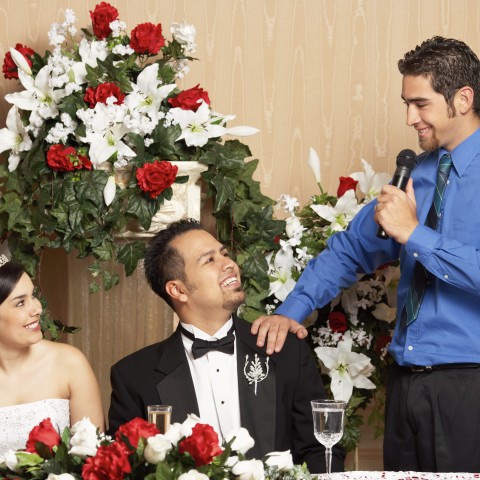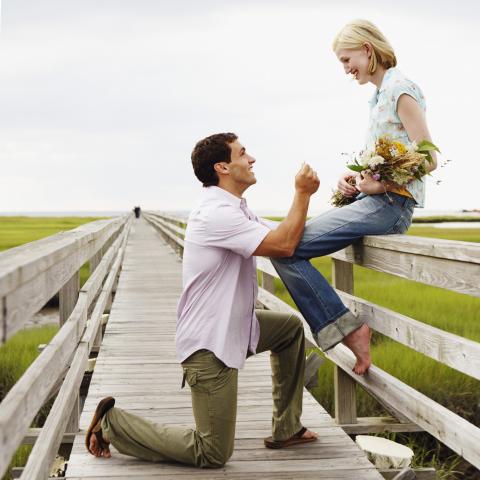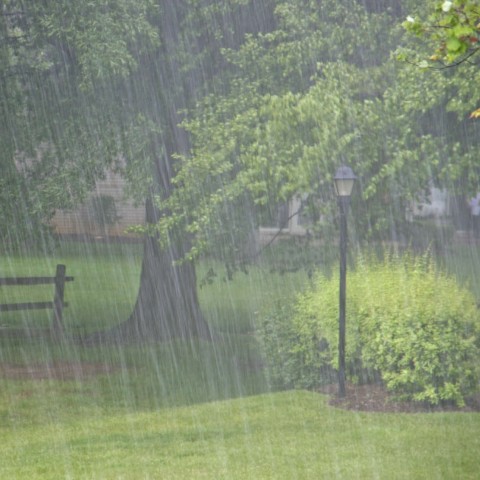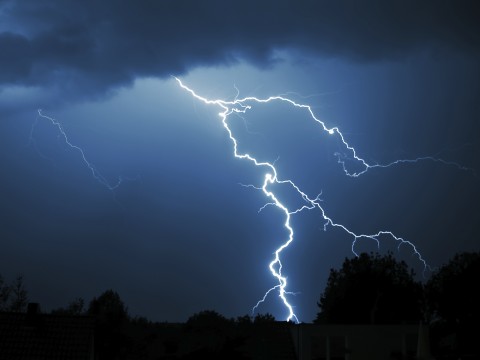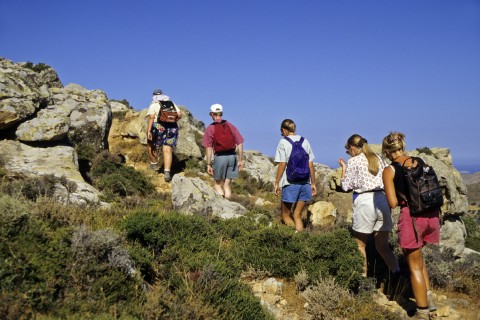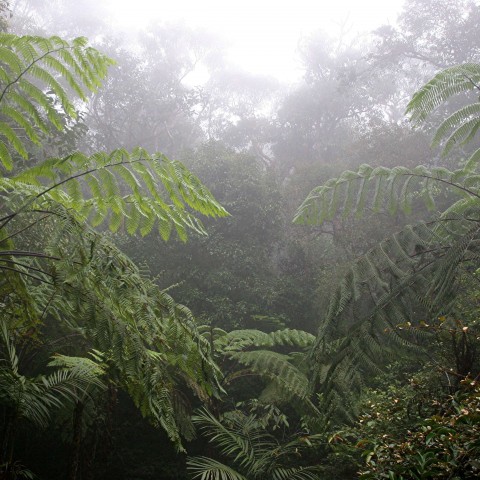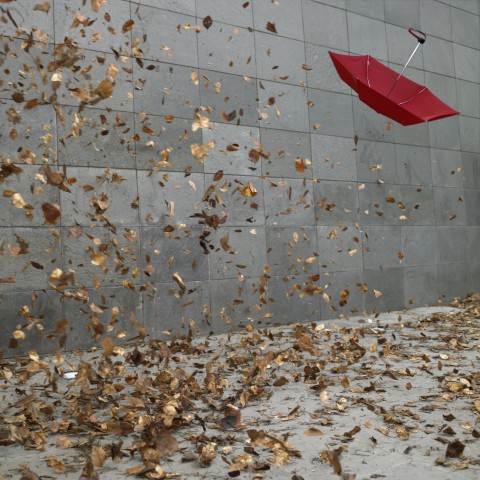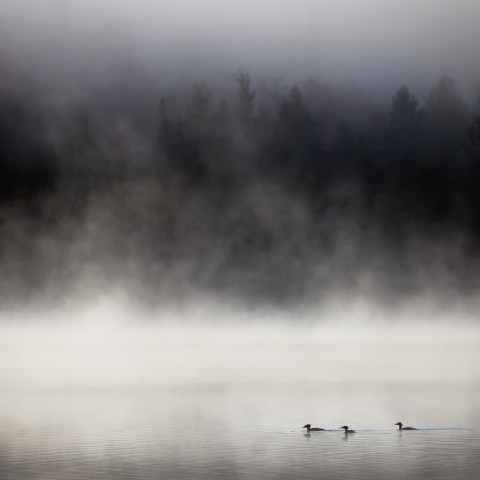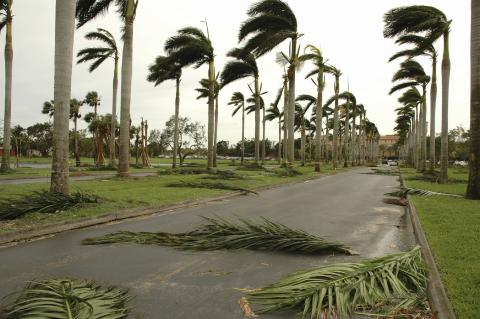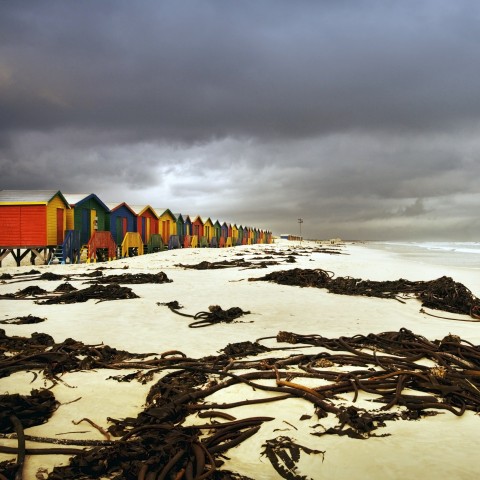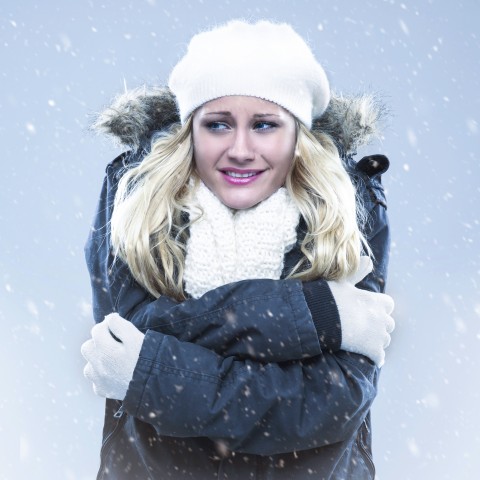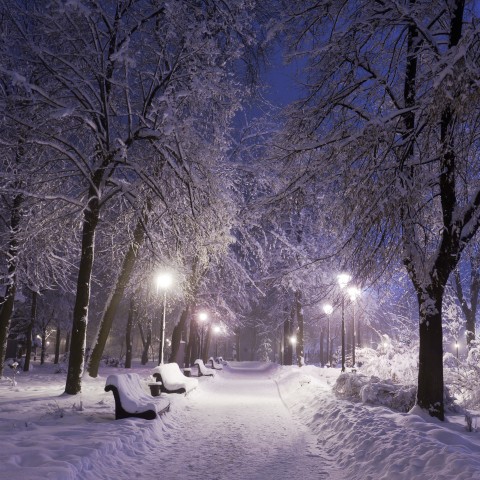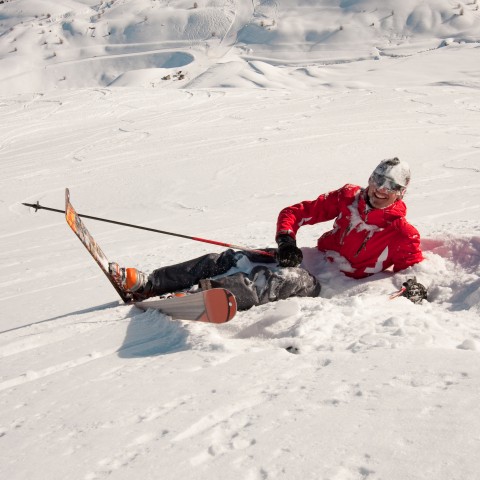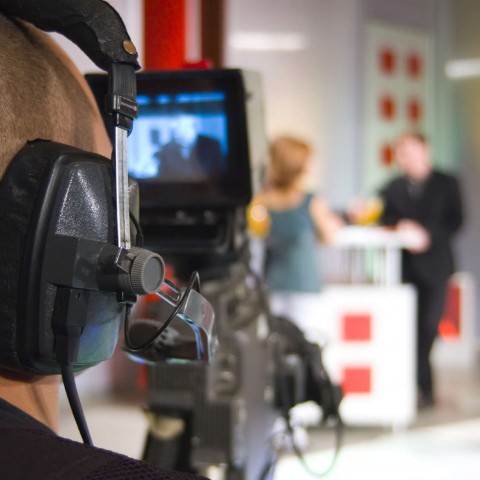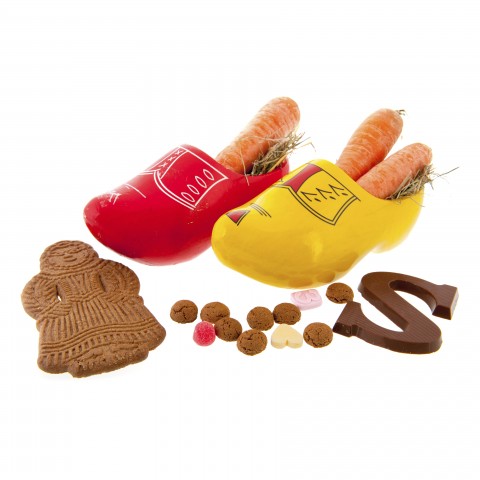
Just like every other country in the world, Bulgaria has a very specific culture influenced by its past and origins. The history of Bulgaria is fascinating and sheds some light on the various aspects of Bulgarian culture and customs, from the way Bulgarians live to their mindset and common character traits. Learners of the Bulgarian language can greatly benefit from knowing more about this country, which some consider to be “The Cradle of Civilization.”
BulgarianPod101 invites you to join us on this intriguing adventure through the culture of Bulgaria. Who knows, maybe this special overview of Bulgarian culture will prompt you to come and experience everything for yourself!
 Table of Contents
Table of Contents
- How Bulgarian History Has Influenced Our Culture
- Philosophies and Religions
- Family & Work
- Art
- The Hospitality of Bulgarian People
- Traditional Bulgarian Holidays
- Cultural Taboos
- How BulgarianPod101 Can Help You Learn Bulgarian
1. How Bulgarian History Has Influenced Our Culture
Bulgaria boasts a long history that has influenced its folklore and ancient rituals, some of which are still preserved to this day. The nation’s religious background has also shaped the character, traditions, and cuisine of the Bulgarian people. Let’s explore the relationship between Bulgarian history and culture in more detail.
What makes Bulgaria special?
Bulgaria is a country located on the Black Sea’s western shore. This land is full of riches and has a very diverse landscape. Here you will find fruitful plains, valleys, and lowlands where lush rivers flow, as well as multiple seaside summer resorts, rural villages, ancient settlements, and high mountains and mountain ranges. The territory of Bulgaria includes all types of relief, and the diversity of its natural resources attracts millions of tourists every year.
Bulgaria is definitely a place worth visiting at least once in a lifetime. Just imagine: spending a nice summer vacation at the beach or by a swimming pool…taking advantage of healing thermal springs and mud baths…exploring artifacts left by the ancient Thracians, Romans, Greeks, and Proto-Bulgarians…or even enjoying mountain resorts that are open to tourists year-round. Yes, please!
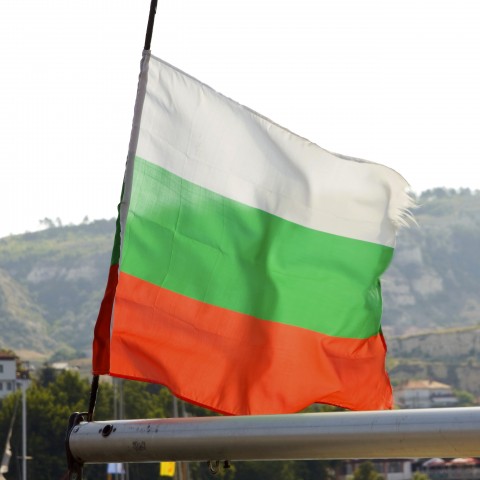
History of Bulgaria
According to ancient historical reports, Bulgarian territory was once inhabited by different tribes who built settlements here as early as 500 BC. They were united by the Odrysian King Teres and later conquered by Alexander the Great. Then, in 46 AD, the Roman Empire took possession of the land, followed by the Byzantine Empire in the fifth century.
The First Bulgarian Empire began in 681 when a treaty with Byzantium was concluded. The first Bulgarian capital was the city of Pliska, and the country was ruled by Khans, who expanded the nation’s territory and strength.
A noble moment in early Bulgarian history was the Bulgarian people’s baptism in the Christian faith. Prior to this, Bulgarians believed in various pagan gods. The Christianization of Bulgaria began in 864, thanks to Khan Boris (who then received the title Knyaz). During the reign of his son Simeon the Great, Bulgaria entered its Golden Age and expanded its territory to reach three seas: the Aegean Sea, the Adriatic Sea, and the Black Sea.
The First Bulgarian Empire ended in 1018 when the Byzantine conquered the entire territory. However, in 1185 the Asen dynasty built the Second Bulgarian Empire after a successful revolt. Unfortunately, this empire also fell, being conquered by the Ottoman Empire in the fourteenth century.
The Ottoman Yoke continued for five centuries, during which there were many unsuccessful revolts. The most popular of them was the 1876 April Uprising, which was severely suppressed by the Ottomans; this resulted in thousands of victims from the Bulgarian population. One year later, in 1877, Russia declared a war against the Ottomans and helped Bulgarians liberate their land. This is how the Third Bulgarian State was established in 1878.
In 1946, Bulgaria became a communist republic. The communist regime remained until late 1989 and was followed by a democracy. This was when Bulgaria opened to the entire world. In the thirty years that followed, Bulgarian culture, customs, art, and heritage were promoted and gained worldwide fame. In 2004, Bulgaria joined NATO; in 2007, it became a European Union member.
- → To gain even more insight into Bulgarian history and culture, you can head over to our lesson on Historical Figures!
Influence on Bulgarian culture
Bulgarian culture and traditions have been greatly influenced by those of the Thracians, Slavs, and Bulgars. After Bulgaria’s Christianization, the Eastern Orthodox Church also began to shape the culture, though numerous ancient customs were preserved and are now recognized as an Intangible Cultural Heritage by UNESCO. Examples include the Thracian barefoot ember dancing known as Nestinarstvo, the dance of the Kukeri, Bulgarian Folklore, and Martenitsa.
The Bulgarian folkloric tradition is so strong that it has influenced many fields, including art, music, literature, celebrations, and even the daily lives of Bulgarians in certain territories of the country.
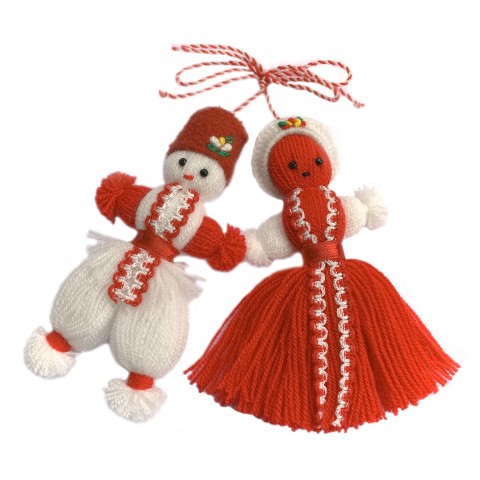
- → Are you interested in learning more about the History of the Bulgarian Language? Then make sure you check out our relevant lesson to gain more insight on the topic.
2. Philosophies and Religions
Religion plays an important role in society, which makes it a key component in understanding Bulgarian culture. In this section, we’ll look at the different ethnic groups in Bulgaria, the prominent religions of the past, and what religion looks like in modern Bulgaria.
Ethnic groups in Bulgaria
Obviously, the majority of Bulgaria’s population consists of Bulgarians, who make up 76.9% of the total population. Turkish people make up another 8% and Romani 4.4%. These are the main ethnic groups in the country. However, you can find many other ethnic groups in different parts of the country, which amount in total to more than 10% of the population. These include Greeks, Russians, Armenians, Ukrainians, Vlachs, etc.
It is interesting to note that in recent years, morе and more foreigners from Western Europe are settling in the rural areas of Bulgaria. They prefer to live in this country, or to spend long summer vacations here.
Before moving on, let’s look at the population’s age demographics:
| Age | % |
| <14 | 14.6% |
| 15 to 24 | 9.43% |
| 25 to 40 | 43.12% |
| 55 to 64 | 13.3% |
| 65+ | 19.54% |
Religions in the past
As we mentioned earlier, ancient Bulgars practiced paganism. They believed in the pagan god Tangra, which is why their religion was called Tengrism. The Slavs and the Thracians who also inhabited this land worshipped different pagan gods, which created a sort of separation between the groups. This separation made them unable to withstand attacks from their surrounding enemies in the face of Byzantium.
One of the main reasons Khan Boris I decided to introduce Christianity into the state was to unite these different tribes into one strong nation. And he succeeded. The unity created by this new religion caused the Byzantine Empire and other great nations to recognize Bulgaria as a kingdom.

Religions in Bulgaria today
The main religion in Bulgaria is still Eastern Orthodox Christianity, to which about 60% of the population adheres. Some of the minorities in the country, such as Russians, Romanians, Greeks, Ukrainians, and Armenians also practice this religion. The Bulgarian Calendar is rich in Orthodox holidays, some of which we’ll discuss later in this lesson.
Islam is Bulgaria’s second largest religion with about 8% of the total population identifying as Muslim. This portion of the population mainly consists of Turkish people, Pomaks, and Roma. There are many villages and cities in Bulgaria with mosques.
Only 0.8% of the Bulgarian population identifies as Catholic; 0.9% (and the number is growing) are Protestants. It is interesting to note that after communism ended, the membership of various Protestant churches in Bulgaria tripled in a matter of ten years. This was due to the foreign missionaries who converted many atheists and Muslims to Christianity. Today, about 10% of Bulgarians are declared atheists or agnostics.
3. Family & Work
In any country, work and family life play significant roles in society. Let’s explore the different facets of work and family in Bulgaria!
Family Values
The most popular family structure in Bulgaria is the nuclear family. Couples normally have one or two children, and it’s rare to see a Bulgarian family with more than three children (with the exception of Roma families).
During the years of communism, family was among the most important values in Bulgaria. In those times, 95% of women believed that a full and satisfying life could be obtained only by having a family. Before democracy was declared in 1989, there were almost no divorces in the country; the few that did happen were looked upon with resentment by society. Things have changed since the start of our democracy and the number of divorces has reached about 10,000 per year.
Western culture has significantly influenced Bulgarian society. According to some sociologists, this has led to the degradation of family values and has made cohabitation a popular choice. In 2011, about 82% of young people aged between 20 and 30 preferred to stay unmarried.
Another change in society is reflected in the relationship between younger and older generations. In the past, elders were widely respected and their children took care of them. Nowadays, the intense speed of our daily routines, as well as the deviation from our traditional family values, have made more and more people rely on hospices and homes to take care of their elderly parents.
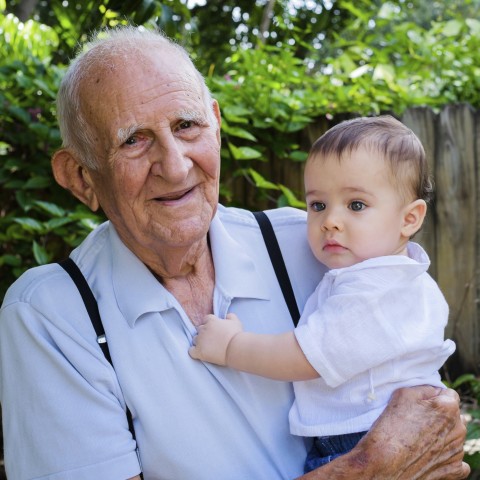
Working in Bulgaria
There has been a recent increase in the number of working people over 45 years of age in Bulgaria, which is a logical consequence of the nation’s aging demographics. Another interesting fact about Bulgarian work culture is that more and more Bulgarians who emigrated to work in foreign countries are returning to Bulgaria. While Bulgaria still has a low salary standard compared to other European countries, the salary is gradually increasing in some sectors, such as IT and outsourcing. This is a motivating factor for job seekers.
The bigger the city, the more jobs there are available. This means that it is more difficult for people who live in the countryside to find a job. Usually, they cultivate the land and raise livestock to produce and sell food.
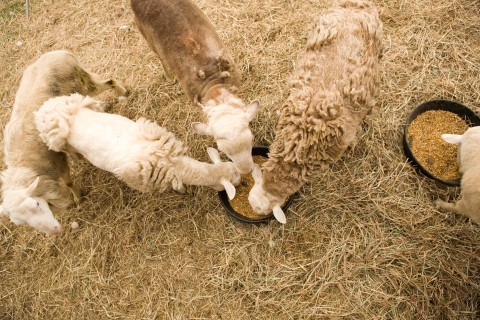
Bulgaria as an agricultural country
Agriculture is well-developed in Bulgaria and the country is an exporter of many kinds of agricultural products. These include different kinds of cereals, technical crops, vegetables, fruits, viticulture, herbs, honey, and even edible mushrooms. The most common cereals include wheat, barley, oats, and rye. Other popular crops include beans, rice, corn, lentils, and alfalfa.
Bulgaria is one of the biggest producers of rose oil and lavender oil in the world. The country is also famous for its tasty and quality dessert and wine grapes. The country’s climate is favorable for an abundance of vegetables and fruits, such as:
- Tomatoes
- Cucumbers
- Peppers
- Squash
- Zucchini
- Cabbage
- Eggplant
- Carrots
- Apples
- Apricots
- Peaches
- Pears
- Plums
- Cherries
- Sour cherries
- Watermelons
- Melons
- All kinds of berries
As for livestock, Bulgarians grow sheep, goats, cattle, buffalo, turkeys, chickens, ducks, geese, pigs, horses, and so on. As a consequence, over 250 thousand tons of milk, 211 thousand tons of meat, and 1.2 million eggs are produced yearly.
4. Art
Bulgarians have contributed to the world’s art development through their great athletes, musicians, opera singers, writers, actors, artists, sculptors, and other personalities who have dedicated their lives to art. Let’s look at three areas of Bulgarian art for which the country is especially famous.
Traditional Bulgarian music
Bulgarian folk music is unique not only because of the special folk instruments used to perform it, but also because of its irregular rhythms, complex harmonies, and the difficulty of the performance. In previous centuries, Bulgarians lived mainly in rural areas, where this was the most popular type of music they created and listened to. Many of the songs and melodies have been passed down from generation to generation until today.
Among the most common musical instruments used in Bulgarian folk music are:
- the gaida (a goatling- or lamb-skin bagpipe)
- the kaval (an end-blown flute)
- the gadulka (a bowed stringed instrument)
- the tupan (а large double-headed drum)
- the tambura (similar to the mandolin)
There are some Bulgarian villages and small towns that have special schools or clubs to teach children and young people how to play these instruments.
One of the most famous Bulgarian folk singers is Valya Balkanska, who was awarded with the highest Bulgarian award “Orden Stara Planina” in 2002. The song Izlel ye Delyo Haydutin, which she performed in 1977, was selected as part of the Golden Record located aboard the two identical spacecraft Voyager 1 and Voyager 2. It is a part of a sound message that the Earth is sending to potential civilizations in the universe. You can hear this popular song here.
Popular sports
Many Bulgarians have gained worldwide fame thanks to their incredible achievements in the world of sports.
Let’s start with Hristo Stoichkov, who is the best-known Bulgarian soccer player of all time. His achievements were so great that many foreigners started to associate Bulgaria with his name. Other popular soccer players of Bulgaria are Dimitar Berbatov and the deceased Georgi Asparuhov, known as Gundi.

Among the most popular Bulgarian boxers are Kubrat Pulev and the late Dan Kolov. Kolov was the first European freestyle wrestling champion from Bulgaria and a mixed martial artist who lived most of his life in the USA.
Another famous name is that of the Bulgarian grandmaster Veselin Topalov, who won the World Chess Championship in 2005 and 2006. Fans of tennis will also be familiar with the name Grigor Dimitrov. Finally, we should mention Stefka Kostadinova, whose World Record of a 209-centimeter high jump in 1987 still remains unbeaten.
Bulgarian literature
There are many notable Bulgarian writers. We’ll start by mentioning Paisiy Hilendarski, who wrote Istoriya Slavyanobolgarskaya in 1762, which was the first written report of Bulgarian history up to that time. Some of the more popular writers include Ivan Vazov with his famous novel Under The Yoke, Emiliyan Stanev with The Peach Thief, and Nikolay Haytov, whose book Wild Stories is included in the Historical Collection of UNESCO.
5. The Hospitality of Bulgarian People
Bulgaria, among other Balkan nations, is famous for its hospitality. Sometimes, Bulgarians еven invite strangers and random visitors for lunch or dinner. However, this kind of hospitality is seen less in the cities and more in rural villages like Ribaritsa (the longest Bulgarian village in Stara Planina), Delchevo (a beautiful village in Pirin, where instead of “Hello,” old people greet with “God bless you”), Leshten (with its nineteenth-century architectural style), Kovachevitsa, and Ognyanovo (where a popular thermal spring is located).
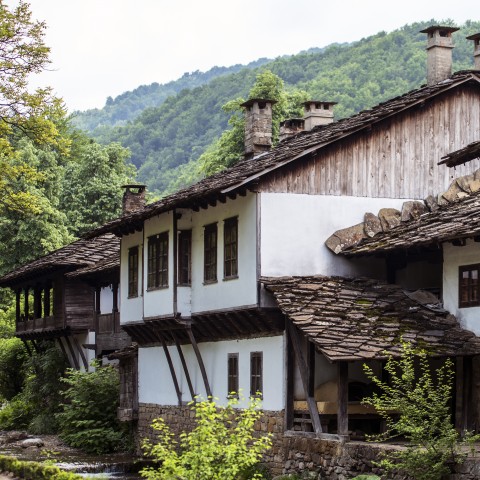
People who offer you hospitality might be offended if you don’t accept their invitation, so it is polite to accept it. Once you enter their home, you are considered a friend. Bulgarians can be very curious about how foreigners live, so be prepared to answer their multiple questions about your country. You can also expect them to reciprocate: most Bulgarians are very garrulous, so you’ll be able to learn many things about Bulgaria in your conversation with them.
Bulgarians who invite foreigners are usually happy to prepare traditional Bulgarian food for them to sample. Common dishes include tarator, banitsa, guvech, and shkembe chorba. This would be a great chance to try authentic Bulgarian dishes cooked by a skilled homemaker who would probably be happy to share the recipes with you—and even give you tips on how to cook them properly.
- → To learn more about the most popular Bulgarian foods and beverages, you can view our lesson on the Top 5 Bulgarian Foods and our vocabulary list titled What’s Your Favorite Bulgarian Food?
6. Traditional Bulgarian Holidays
Knowing about the most popular Bulgarian holidays will allow you to plan your visit for a period when the most important cultural events in Bulgaria are happening. Taking part in the festive atmosphere will help you experience the culture, personality, and history of this country better. However, be aware that some restaurants and shops, and most public institutions, are closed during the official holidays.
Liberation Day (March 3)
This day celebrates the Liberation of Bulgaria in 1878 from the Ottoman Rule. This took place after the Russian Empire won the last Russian-Turkish War. From that day on, Bulgaria was a free country again.
St. George’s Day (May 6)
May 6 is associated with the Christian martyr St. George, who killed the dragon. In Bulgaria, it is also celebrated as the day of the Bulgarian Army and bravery. To celebrate, Bulgarians usually prepare a whole lamb as a traditional meal for the entire family. Moreover, the name George (Георги) is very common in Bulgaria and those with this name celebrate their name day on May 6 as well.
Day of the Bulgarian Alphabet (May 24)
The alphabet created by the Slavonic brothers Cyril and Methodius is called Glagolitsa. It was later simplified by their students, who named the new alphabet after Cyril: Cyrillic alphabet. On May 24, all students and teachers in Bulgaria have a special celebration.
Easter
This is among the most important religious holidays in Bulgaria, celebrating the Resurrection of Christ. If you are in the country during this period, your Bulgarian friends will probably give you a painted hard-boiled egg and a special sweet Easter bread called kozunak.
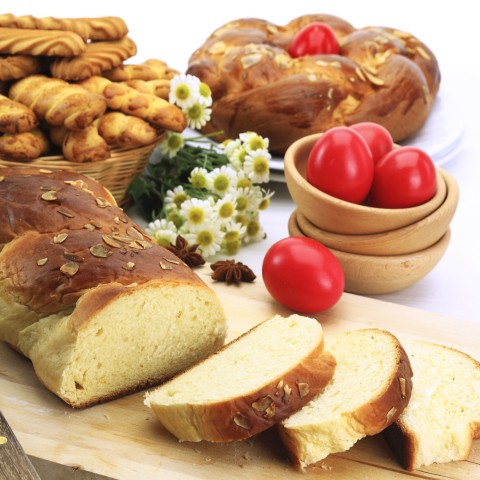
- → In this article, you can learn more about another Bulgarian holiday related to Easter: Tsvetnitsa.
Christmas Eve (December 24)
This is another religious holiday in Bulgaria, celebrating the birth of Christ on Earth. According to Bulgarian traditions for this holiday, we only eat lean dishes on Christmas Eve, and there should be a specific number of dishes: 7, 9, or 11/12 different kinds. A festive bread or banitsa should be made with a coin hidden inside; whoever finds the coin in his piece is considered lucky and will have prosperity and health in the next year.
7. Cultural Taboos
Bulgarians accept people of different countries, social levels, professions, etc. They are generally open to foreigners, which is why the country is home to so many minorities from many different countries. But there are still a couple of things to consider in order to be polite while visiting someone’s house.
When you’re invited to be a guest in someone’s house, it is considered impolite to enter without taking off your shoes. Even Bulgarians take off their shoes when entering the home, even if the housewife insists that they don’t have to do that. This is a sign of respect toward the housewife’s work. She will probably offer you slippers, but some Bulgarians prefer to take their own slippers from home when visiting friends, so you could opt to do the same. It is also impolite to refuse any food or drink offered to you by the host.
8. How BulgarianPod101 Can Help You Learn Bulgarian
There are certainly many fascinating aspects of Bulgarian culture, and we hope that our brief overview has inspired you to continue learning. There is so much more for you to discover, and the more you know Bulgaria, the more effective and immersive your language studies will be.
If you would like to continue studying the Bulgarian language with a personal teacher, you can choose one from MyTeacher by creating a Premium PLUS account. Native Bulgarian linguists will not only lead you through the grammar points, but will also share with you more interesting facts about Bulgarian history and culture.
Before you go, let us know in the comments if there’s anything we missed in this lesson. Is there anything you still want to know about Bulgarian culture? We’ll get back to you as soon as possible!

Telling Time in Bulgarian – Everything You Need to Know

What’s your relationship with the clock like? Does it run your day from a morning alarm to a cut-off chime for bed, or are you more of a go-with-the-flow type, letting your mood and emotions decide how much you fall in line with time?
Understanding time in Bulgarian is an important part of your studies. As humans, our lives are filled with habits and schedules. From waking up and going to work or gym, to missing rush hour traffic on our way home, we’re always aware of time. We have routines around coffee breaks, meetings, soccer games and vacations. In fact, time can seem rather capricious – going slowly, going fast, sometimes against us, other times on our side – like a force that has a life of its own.
In science, time is often referred to as a fourth dimension and many physicists and philosophers think that if we understood the physics of the universe, we would see that time is an illusion. We sense an ‘arrow’ or direction of time because we have memories, but really time is just a construct that humans have created to help make sense of the world.
On the other hand, poets through the ages have written impassioned thoughts about time, depicting it as both a relentless thief and an immensely precious resource, not to be wasted at any cost.
Well, poets and scientists may have their views, but in our everyday lives there’s the question of practicality, isn’t there? I mean, if you have plans and want things to happen your way, there’s a certain amount of conforming to the human rules of time that you can’t avoid.
In ‘The Little Prince’ by Antoine de Saint-Exupéry, the prince has a rose that he falls in love with, and he tenderly protects it with a windscreen and places it under a glass dome on his tiny planet. I love this quote from the book: “It is the time you have wasted for your rose that makes your rose so important.” If we truly love something, we spend time with it and not a second of that time could ever be seen as wasted. I feel that way about horses, my children, travel and learning languages.
With that in mind, I’d like to take you on a journey into ‘time’ from a Bulgarian perspective. It’s fun, it’s informative and it’s a basic necessity if you’re learning the language – especially if you plan to travel. BulgarianPod101 has all the vocab you need to fall in love with telling time in Bulgarian, and not a minute will be wasted.
 Table of Contents
Table of Contents
1. Talking about Time in Bulgarian
As a traveler, your primary need for knowing how to read the hour in Bulgarian will be for transportation schedules: the bus, train, airplane, ferry, taxi… whatever you plan to use to get from A to B, it won’t wait for you! Fortunately, it’s really not complicated. You already have a firm grasp of time in English and you know you’ll need to reset your watch and phone to the local time. Great – that means you’ll have the correct time on your person.
We’re so used to just looking at our phones for the time, that it’s easy to take this convenience for granted and forget some travel basics: in a foreign country, times won’t always be written digitally. If you see the time written in words, it’ll be the same challenge to you as hearing it spoken: you’ll need to be familiar with the language.
You may be surprised at how often ‘time’ comes into conversation. Learning the Bulgarian terms for time will help you when you have to call a taxi, ask about opening and closing times of events and tourist attractions, restaurants and bars and even late-night food cafes.
My biggest annoyance when traveling is not being able to get coffee and amazingly, even at nice hotels this has happened more times than I care to think about. I’ll be up late planning something, writing my blog or chatting and when I go looking for coffee downstairs, I’m told the kitchen is closed or the ‘coffee lady’ has gone to sleep. Frustrating!
If you’re doing a homestay or at a youth hostel or backpackers, there will probably also be a limited timeframe for when you can grab dinner. Do you know how to ask when it’s time to eat in Bulgarian? I’ve learned that it’s vital to know how to make my queries clearly understood to accommodation staff and for me to clearly understand their answers. Perfect your ‘time in Bulgarian’ translations early on – you’ll thank me.
At BulgarianPod101, we’ve put together a comprehensive list of Bulgarian time words and phrases to get you going.
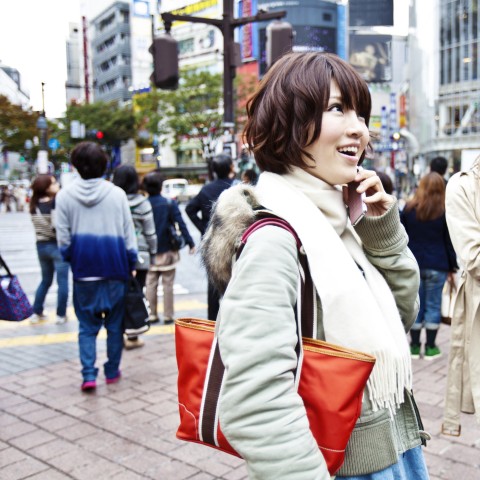
1- Morning – сутрин (sutrin)
Morning is the time when we wake up from our dreamworld, hopefully fully rested and restored; we brew the first delicious cup of coffee for the day and watch the sunrise as we prepare for another glorious twelve hours of life. No matter what happened the day before, a new morning is a chance to make everything right.
I like these quiet hours for language practice, as my mind is clear and receptive to learning new things. I start by writing the Bulgarian time, date and word of the day on my whiteboard, then get back under the covers for an engrossing lesson.
Time in the morning is written as AM or A.M., which stands for ante meridiem – meaning ‘before midday’ in Latin.

2- Evening – вечер (vecher)
Evening is the part of night when we’re still awake and doing things, winding down from the day. Whether you enjoy a tasty international dinner with friends, go out to see a show, or curl up on the couch with a Bulgarian snack and your favorite TV series, evening is a good time to forget your worries and do something that relaxes you. If you’re checking in with your Facebook friends, say hi to us, too!
Evening is also an ideal time to catch up on your Bulgarian studies. The neighbourhood outside is likely to be quieter and time is yours, so grab a glass of wine or a delicious local tea, and see what’s new on your Mac App or Kindle.
3- Daytime – денем (denem)
Daytime is defined as the period from early morning to early evening when the sun is visible outside. In other words: from sunrise to sunset. Where you are in the world, as well as the season, will determine how many daylight hours you get.
Interestingly, in locations north of the Arctic Circle and south of the Antarctic Circle, in summertime the sun does not sink below the horizon within a 24-hour period, bringing the natural phenomenon of the midnight sun. You could only experience this in the north, though, because there aren’t any permanent human settlements south of the Antarctic Circle.
4- Nighttime – нощно време (noshtno vreme)
Nighttime is all the hours from sunset to sunrise and depending on where in the country you are, people may be partying all night, or asleep from full-dark.
In the same northernmost and southernmost regions where you can experience a midnight sun, winter brings the opposite phenomenon: the polar night. Can you imagine a night that lasts for more than 24 hours?

5- Hour – час (chas)
An hour is a unit of time made up of 60 minutes and is a variable measure of one-24th of a day – also defined by geeks as 3 600 atomic seconds. Of all the ‘time’ words we use on a daily basis, the hour is the most important, as time of day is typically expressed in terms of hours.
One of the interesting methods of keeping time that people have come up with is the hourglass. Although the origins are unclear, there’s evidence pointing to the hourglass being invented around 1000 – 1100 AD and one of the ways we know this, is from hourglasses being depicted in very old murals. These days, with clocks and watches in every direction we look, they’re really only used symbolically to represent the passage of time. Still – a powerful reminder of our mortality and to seize the day. In his private journal, the Roman emperor, Marcus Aurelius, wrote: “You could leave life right now. Let that determine what you do and say and think.”

6- Minute – минута (minuta)
Use this word when you want to say a more precise time and express minutes in Bulgarian. A minute is a unit of time equal to one sixtieth of an hour, or 60 seconds. A lot can happen in the next 60 seconds. For example, your blood will circulate three times through your entire vascular system and your heart will pump about 2.273 litres of blood.
7- O’clock – часа (chasa)
We use “o’clock” when there are no minutes and we’re saying the exact hour, as in “It’s two o’clock.”
The term “o’clock” is a contraction of the term “of the clock”. It comes from 15th-century references to medieval mechanical clocks. At the time, sundials were also common timekeepers. Therefore, to make clear one was referencing a clock’s time, they would say something like, “It is six of the clock” – now shortened to “six o’clock”.
We only use this term when talking about the 12 hour clock, though, not the 24 hour clock (more on that later!) The 12-hour clock can be traced back as far as Mesopotamia and ancient Egypt. Both an Egyptian sundial for daytime use and an Egyptian water clock for nighttime use were found in the tomb of Pharaoh Amenhotep I. Dating to c.1500 BC, these clocks divided their respective times of use into 12 hours each. The Romans also used a 12-hour clock. Daylight was divided into 12 equal hours and the night was divided into four watches.
These days, the internet has made it very easy to know what the time is in any part of the world. Speaking of which, why not add the Bulgarian time zone clock to your laptop?

8- Half past – и половина (i polovina)
When the time is thirty minutes past the hour, in English we say “half past”. Just like the hour, the half-hour is universally used as an orientation point; some languages speak of 30 minutes before the hour (subtraction), whereas others speak of 30 minutes after the hour (addition).
9- AM – преди обед (predi obed)
As mentioned earlier, AM is the abbreviation of the Latin ante meridiem and means before midday. Using ‘AM’ as a tag on your time simply tells people you’re speaking about a time in the morning. In some countries, morning is abbreviated to “AM” and you’ll see this on shop signs everywhere, announcing the opening hour. A typical shop sign might read something like this:
“Business hours are from 7AM to 6PM.”
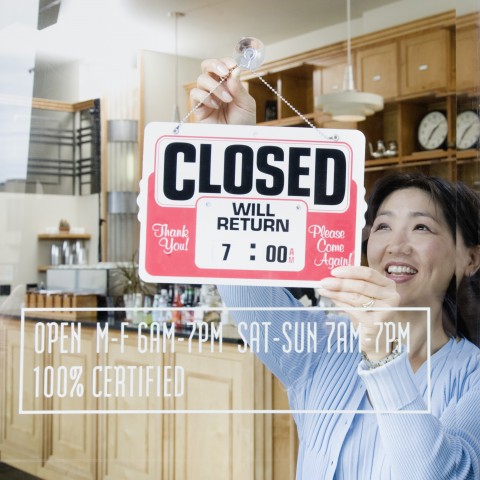
10- PM – следобед (sledobed)
PM is the abbreviation of the Latin post meridiem and means after midday. Along with ‘AM’, you’ll usually find ‘PM’ on store signs and businesses, indicating the closing hours. It’s advisable to learn the difference between the two, since some establishments might only have one or the other on the sign. For example, a night club sign might say:
“Open from 10 PM until late.”
11- What time is it now? – Колко е часът сега? (Kolko e chasat sega?)
Here’s a very handy question you should memorize, as you can use it in any situation where you don’t have your watch or phone on you. This could be on the beach, in a club, or if you’re stuck anywhere with a flat phone battery. It happens at home, so it can happen when you’re traveling!

12- One o’clock – 1 часа (edin chasà)
One o’clock, or 1 PM, is the average lunch time for many people around the world – at least, we try to get a meal in at some point between midday and 2 PM. In terms of duration, the nations vary: Brazililans reportedly take the longest lunch breaks, averaging 48 minutes, whereas Greece reports an average break of only 19 minutes. Historically, Greeks were known for their very leisurely lunch breaks, so it just goes to show how fast the world is changing. If you’re curious about what to expect in Bulgaria, try asking our online community about lunch time in Bulgarian.
13- Two o’clock – два часá (dva chasá)
In his last days, Napoleon Bonaparte famously spoke of “Two o’clock in the morning courage” – meaning unprepared, spontaneous courage. He was talking about soldiers who are brave enough to tumble out of bed in an instant, straight into action, without time to think or strategize. Do you think you have what it takes? I’m pretty sure all mothers know this feeling!
14- Three o’clock – три часá (tri chasá)
3 AM can be perceived as the coldest time of day and is not an hour we want to wake up, but meteorologists will tell you that the coldest time is actually half an hour after sunrise. Even though the sun is peeking over the horizon, the solar radiation is still weaker than the earth’s infrared cooling to space.
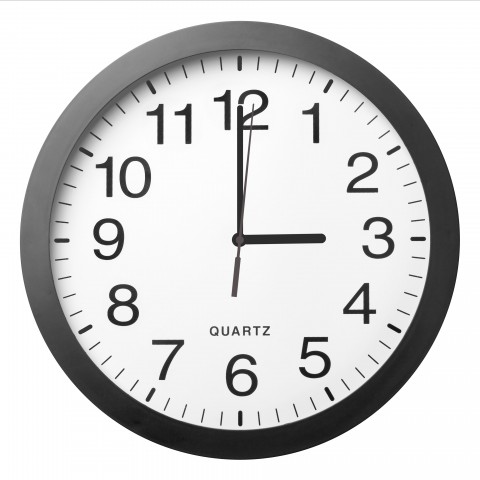
15- Four o’clock – четири часá (chetiri chasá)
Do you know anyone who purposely gets up at 4 o’clock in the morning? As crazy as it sounds, there is something to be said for rising at 4 AM while the rest of the world sleeps. If you live on a farm, it might even be normal for you. I know that whenever I’m staying in the countryside, rising early is a lot easier, because there’s a satisfying reason to do so: watching a sunrise from a rooftop, with uninterrupted views, can’t be beat! It’s also likely that you’ll be woken by a cock crowing, or other animals waking to graze in the fresh pre-dawn air.
In the world of business, you’ll find a small group of ambitious individuals – many entrepreneurs – who swear by the 4 o’clock in the morning rise. I’m not sure I like that idea, but I’d wake up at 4 AM if it was summer and I had my car packed for a vacation!
16- Five o’clock – пет часá (pet chasá)
What better way to signal the transition between work and play than the clock hands striking 5 o’clock? It’s the hour most working people look forward to each day – at least, those who get to stop working at 5 PM. Meanwhile, millions of retired folks are taking out the wine glasses, as 5 PM is widely accepted as an appropriate time to pour the first glass. I don’t know how traditional your families are, but for as long as I’ve been alive, my grandparents have counted down the milliseconds to five o’clock, and the hour is announced with glee.
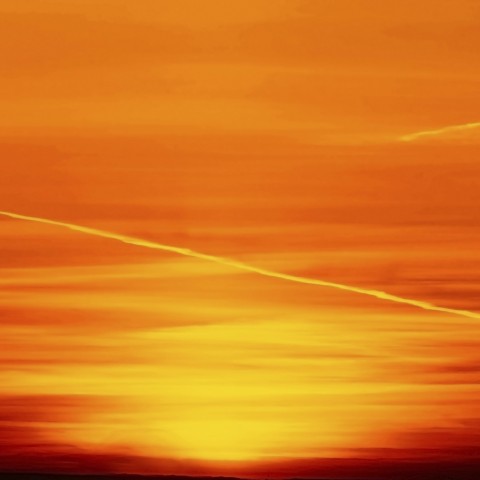
17- Six o’clock – шест часá (shest chasá)
This is the time many working people and school kids wake up in the morning. In many parts of the world, 6 o’clock is also a good time to watch the sunrise, go for a run or hit the hiking trails.
18- Seven o’clock – седем часа (sedem chasà)
Health gurus will tell you that 7 o’clock in the morning is the best time to eat your first meal of the day, and 7 o’clock in the evening is the time you should eat your last meal. I’ve tried that and I agree, but it’s not always easy!
19- Eight o’clock – осем часá (osem chasà)
8 o’clock in the morning is the time that most businesses open around the world, and the time most kids are in their first lesson at school – still full of energy and willing to participate. Interestingly, it’s also the time most babies are born in the world! In the evening, 8 o’clock is many young children’s bedtime and the time for parents to watch the evening news.

20- Nine o’clock – девет часа (devet chasà)
It’s good to occasionally sleep late on a weekend and for me, this means waking up at 9 AM. If you’re traveling in Bulgaria and staying at a hotel, planning to sleep late means politely requesting to not be woken up by room service.
21- Ten o’clock – десет часá (deset chasà)
10 o’clock in the morning is a popular time to conduct business meetings, and for first break time at schools. We’re usually wide awake and well into our day by then. But what about the same hour at night? Modern people are often still awake and watching TV at 10 PM, but this isn’t exactly good for us. Experts say that the deepest and most regenerative sleep occurs between 10 PM and 2 AM, so we should already be sound asleep by ten o’clock.
In advertising, have you ever noticed that the hands of the clock usually point to 10:10? Have a look next time you see a watch on a billboard or magazine. The reason? Aesthetics. Somehow, the human brain finds the symmetry pleasing. When the clock hands are at ten and two, they create a ‘smiley’ face and don’t cover any key details, like a logo, on the clock face.
22- Eleven o’clock – единадесет часа (edinadeset chasà)
When I see this time written in words, it makes me think of the hilarious Academy Award-winning very short film, “The Eleven O’Clock”, in which the delusional patient of a psychiatrist believes that he is actually the doctor.
Then there’s the tradition of ‘elevenses’ – tea time at eleven o’clock in the morning. Strongly ingrained in British culture, elevenses is typically a serving of hot tea or coffee with scones or pastries on the side. It’s a great way to stave off hunger pangs before lunch time arrives. In fact, if you were a hobbit, ‘Elevenses’ would be your third meal of the day!
23- Twelve o’clock – дванайсет часá (dvanadeset chasà)
Twelve o’clock in the daytime is considered midday, when the sun is at its zenith and the temperature reaches its highest for that day; it’s written as 12 noon or 12 PM. In most parts of the world, though, this doesn’t happen at precisely 12 PM. ‘Solar noon’ is the time when the sun is actually at its highest point in the sky. The local or clock time of solar noon depends on the longitude and date. If it’s summertime, it’s advisable to stay in the shade during this hour – or at least wear good quality sunblock.
Midnight is the other ‘twelve o’clock’, of course. Midnight is written as 12 AM and is technically the first minute of the morning. On the 24-hour clock, midnight is written as 00:00.
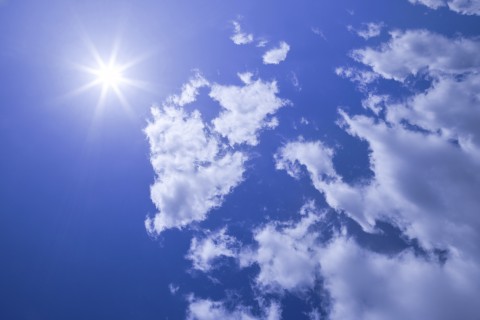
2. How to Tell the Time in Bulgarian

Using a clock to read the time in Bulgaria is going to be the same as in your own country, since you’re dealing with numbers and not words. You’ll know the time in your head and be able to say it in English, but will you be able to say it out loud in Bulgarian?
The first step to saying the time in Bulgarian is knowing your numbers. How are you doing with that? If you can count to twelve in Bulgarian, you’re halfway there! We’ve already covered the phrases you’ll need to say the exact hour, as in “five o’clock”, as well as how to say “half past”. What remains is the more specific phrases to describe what the minute hand is doing.
In everyday speech, it’s common to say the minutes past or before the hour. Often we round the minutes off to the nearest five.
Then, there’s the 24-hour clock. Also known as ‘military time’, the 24-hour clock is used in most countries and, as such, is useful to understand. You’ll find that even in places where the 12-hour clock is standard, certain people will speak in military time or use a combination of the two. No doubt you’ve also noticed that in written time, the 24-hour clock is commonly used. One of the most prominent places you’ll have seen this is on airport flight schedules.
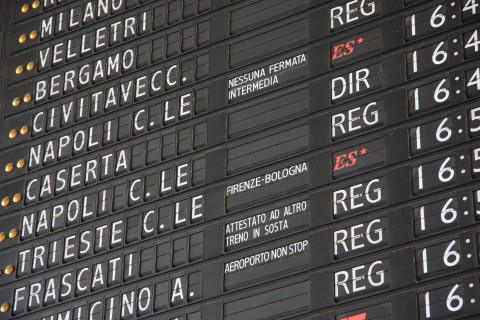
Knowing how to tell military time in Bulgarian is really not complicated if you know your numbers up to twenty-four. One advantage of using the 24-hour clock in Bulgarian, is there’s no chance of confusing AM and PM.
Once you know how to say the time, it will be pretty easy to also write the time in Bulgarian. You’re already learning what the different hours and minutes look and sound like, so give yourself some writing practice of the same.
3. Conclusion
Now that you understand the vocabulary for telling time in Bulgarian, the best thing you can do to really lock it down is to just practice saying Bulgarian time daily. Start by replacing English with Bulgarian whenever you need to say the time; in fact, do this whenever you look at your watch. Say the time to yourself in Bulgarian and it will become a habit. When learning a new language, the phrases you use habitually are the ones your brain will acquire. It feels amazing when that turning point comes!
To help yourself gain confidence, why don’t you make use of our various apps, downloadable for iPhone and iPad, as well as Android? Choose what works best for you. In addition, we have so many free resources available to supplement your learning, that you simply can’t go wrong. Some of these are:
- Free lessons on iTunes
- A free mini lesson every day with the Innovative Language Calendar.
- Free audio books for lessons on the go.
If you prefer watching your lessons on video, check out our YouTube channel – there are hundreds of videos to browse. For those of you with Roku, we also have a TV channel you can watch.
Well, it’s time for me to say goodbye and for you to practice saying the time in Bulgarian. Look at the nearest clock and try to say the exact time, down to the seconds. See you again soon at BulgarianPod101!

Essential Vocabulary for Directions in Bulgarian

Do you know your left from your right in Bulgarian? Asking for directions can mean the difference between a heavenly day on the beach and a horrible day on your feet, hot and bothered and wondering how to even get back to the hotel. Believe me – I know! On my earlier travels, I didn’t even know simple terms like ‘go straight ahead’ or ‘go west,’ and I was always too shy to ask locals for directions. It wasn’t my ego, but rather the language barrier that held me back. I’ve ended up in some pretty dodgy situations for my lack of directional word skills.
This never needs to happen! When traveling in Bulgaria, you should step out in confidence, ready to work your Bulgarian magic and have a full day of exploring. It’s about knowing a few basic phrases and then tailoring them with the right directional words for each situation. Do you need to be pointed south in Bulgarian? Just ask! Believe me, people are more willing to help than you might think. It’s when you ask in English that locals might feel too uncertain to answer you. After all, they don’t want to get you lost. For this reason, it also makes sense that you learn how to understand people’s responses.
Asking directions in Bulgaria is inevitable. So, learn to love it! Our job here at BulgarianPod101 is to give you the confidence you need to fully immerse and be the intrepid adventurer you are.
 Table of Contents
Table of Contents
1. Talking about position and direction in Bulgarian
Have you ever tried saying the compass directions of north, south, east and west in Bulgarian? These words are good to know, being the most natural and ancient method of finding direction. In the days before GPS – before the invention of the compass, even – knowing the cardinal directions was critical to finding the way. Certainly, if you were lost somewhere in the mountain regions now and using a map to navigate, you’d find them useful. Even more so if you and a Bulgarian friend were adrift at sea, following the stars!
In most situations, though, we rely on body relative directions – your basic up, down, left and right, forward and backwards. Most cultures use relative directions for reference and Bulgarian is no exception. Interestingly, in a few old languages there are no words for left and right and people still rely on cardinal directions every day. Can you imagine having such a compass brain?
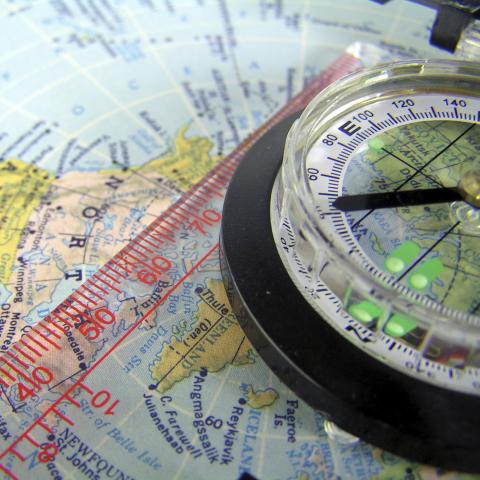
Well, scientists say that all mammals have an innate sense of direction, so getting good at finding your way is just a matter of practice. It’s pretty cool to think that we were born already pre-wired to grasp directions; the descriptive words we invented are mere labels to communicate these directions to others! Thus, the need to learn some Bulgarian positional vocabulary. So, without further ado… let’s dive in.
1- Top – връх (vrah)
If planting a flag at the top of the highest mountain in Bulgaria is a goal you’d rather leave for adrenaline junkies, how about making it to the top of the highest building? Your view of the city will be one you’ll never forget, and you can take a selfie for Twitter with your head in the clouds.

2- Bottom – основа (osnova)
The ‘bottom’ can refer to the lower end of a road, the foot of a mountain, or the ground floor of a building. It’s the place you head for after you’ve been to the top!
What are your favorite ‘bottoms’? I love the first rung of a ladder, the base of a huge tree or the bottom of a jungle-covered hill. What can I say? I’m a climber. Divers like the bottom of the ocean and foxes like the bottom of a hole. Since you’re learning Bulgarian, hopefully you’ll travel from the top to the bottom of Bulgaria.
3- Up – нагоре (nagore)
This is a very common and useful word to know when seeking directions. You can go up the street, up an elevator, up a cableway, up a mountain… even up into the sky in a hot air balloon. It all depends on how far up you like to be!

4- Down – надолу (nadolu)
What goes up, must surely come down. This is true of airplanes, flaming arrows and grasshoppers – either aeronautics or gravity will take care of that. In the case of traveling humans who don’t wish to go down at terminal velocity, it’s useful to know phrases such as, “Excuse me, where is the path leading back down this mountain?”
5- Middle – среда (sreda)
In Lord of the Rings, Tolkien’s characters live in Middle-earth, which is just an ancient word for the inhabited world of men; it referred to the physical world, as opposed to the unseen worlds above and below it. The ancients also thought of the human world as vaguely in the middle of the encircling seas.
When we talk about the ‘middle’, we’re referring to a point that’s roughly between two horizontal lines – like the middle of the road or the middle of a river. While you’re unlikely to ask for directions to the ‘middle’ of anything, you might hear it as a response. For example, “You’re looking for the castle ruins? But they’re in the middle of the forest!”
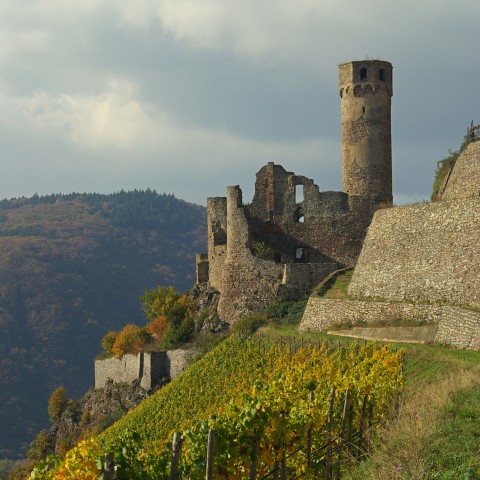
6- Center – център (tsentar)
Although similar in meaning to ‘middle’, this word is more specific. Technically, it means the exact central point of a circular area, equally distant from every point on the circumference. When asking for directions to the center of town, though, we don’t mean to find a mathematically-accurate pinpoint!

7- Front – лице (litse)
The front is the place or position that is seen first; it’s the most forward part of something. In the case of a hotel, the front is going to be easy to recognize, so if you call a taxi and are told to wait “in front of the hotel”, you won’t have a problem. It’s pretty cool how just knowing the main Bulgarian directional words can help you locate something if there’s a good landmark nearby.
8- Back – гръб (grab)
I once rented a house in a charming little street that was tucked away at the back of a popular mall. It was so easy to find, but my boss took three hours to locate it from 300 meters away. Why? Well, because she spoke no English and I had no clue what the word for ‘back’ was. All she heard, no matter which way I said it, was “mall, mall, mall”. As a result, she hunted in front of and next to the mall until she was frazzled.
Knowing how to describe the location of your own residence is probably the first Bulgarian ‘directions’ you should practice. This skill will certainly come in handy if you’re lost and looking for your way home.
9- Side – страна (strana)
If the place you’re looking for is at the ‘side’ of something, it will be located to the left or the right of that landmark. That could mean you’re looking for an alleyway beside a building, or a second entrance (as opposed to the main entrance).
As an example, you might be told that your tour bus will be waiting at the right side of the building, not in front. Of course, then you’ll also need to understand “It’s on the right” in Bulgarian.
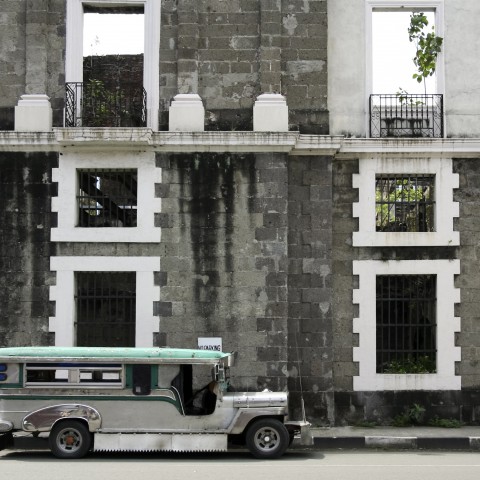
10- East – изток (iztok)
If you’re facing north, then east is the direction of your right hand. It’s the direction toward which the Earth rotates about its axis, and therefore the general direction from which the sun appears to rise. If you want to go east using a compass for navigation, you should set a bearing of 90°.
We think of Asia as the ‘East’. Geographically, this part of the world lies in the eastern hemisphere, but there’s so much more that we’ve come to associate with this word. The East signifies ancient knowledge and is symbolic of enlightenment in many cultures.
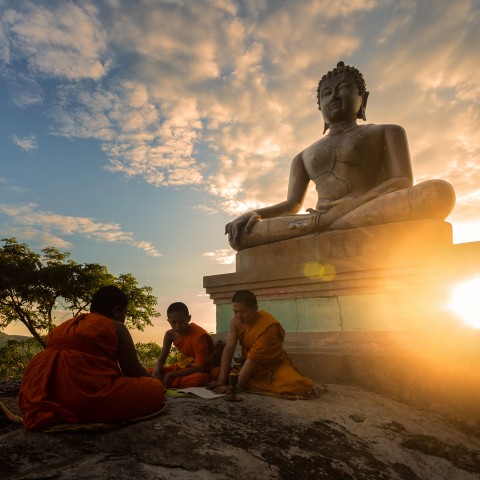
11- West – запад (zapad)
West is the opposite to east and it’s the direction in which the sun sets. To go west using a compass, you’ll set a bearing of 270 degrees.
If you were on the planet Venus, which rotates in the opposite direction from the Earth (retrograde rotation), the Sun would rise in the west and set in the east… not that you’d be able to see the sun through Venus’s opaque clouds.
Culturally, the West refers mainly to the Americas and Europe, but also to Australia and New Zealand, which are geographically in the East. The Western way of thinking is very different to that of the East. One of the most striking differences is individualism versus collectivism. In the West, we grew up with philosophies of freedom and independence, whereas in the East concepts of unity are more important.
Food for thought: as a traveler who’s invested in learning the languages and cultures of places you visit, you have an opportunity to become a wonderfully balanced thinker – something the world needs more of.
12- North – север (sever)
North is the top point of a map and when navigating, you’d set a compass bearing of 360 degrees if you want to go that way. Globes of the earth have the north pole at the top, and we use north as the direction by which we define all other directions.
If you look into the night sky, the North Star (Polaris) marks the way due north. It’s an amazing star, in that it holds nearly still in our sky while the entire northern sky moves around it. That’s because it’s located nearly at the north celestial pole – the point around which the entire northern sky turns. Definitely a boon for lost travelers!
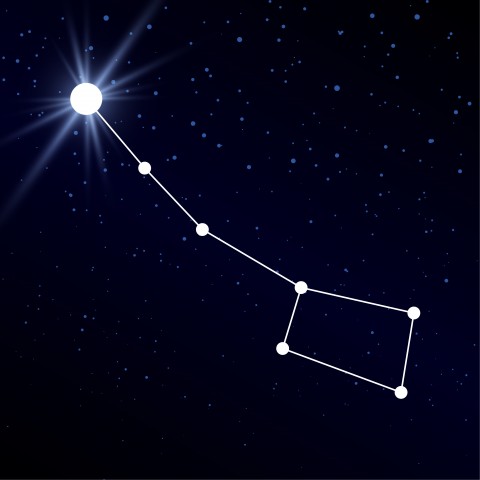
13- South – юг (yug)
South is the opposite of north, and it’s perpendicular to the east and west. You can find it with a compass if you set your bearings to 180 degrees.
The south celestial pole is the point around which the entire southern sky appears to turn. In the night sky of the southern hemisphere, the Southern Cross is a very easy to find constellation with four points in the shape of a diamond. If you come from the southern hemisphere, chances are your dad or mum pointed it out to you when you were a kid. You can use the Southern Cross to find south if traveling by night, so it’s well worth figuring it out!
14- Outside – отвън (otvan)
This word refers to any place that is not under a roof. Perhaps you’ve heard talk about some amazing local bands that will be playing in a nearby town on the weekend. If it’s all happening outside, you’ll be looking for a venue in a park, a stadium or some other big open space. Come rain or shine, outside definitely works for me!
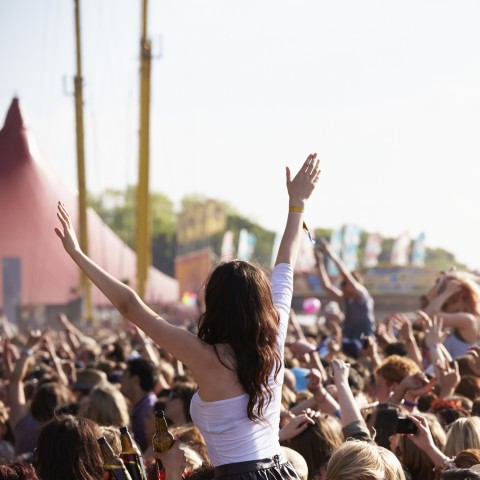
15- Inside – вътре (vatre)
I can tolerate being inside if all the windows are open, or if I’m watching the latest Homeland episode. How about you? I suppose going shopping for Bulgarian-style accessories would be pretty fun, too, and that will (mostly) be an inside affair.
16- Opposite – противоположен (protivopolozhen)
This is a great word to use as a reference point for locating a place. It’s right opposite that other place! In other words, if you stand with your back to the given landmark, your destination will be right in front of you.
17- Adjacent – съседен (saseden)
So, the adorable old man from next door, who looks about ninety-nine, explains in Bulgarian that the food market where he works is adjacent to the community hall on the main road. ‘Adjacent’ just means next to or adjoining something else, so… head for the hall!
While you’re marveling at the wondrous and colorful displays of Bulgarian food, think about how all of these delicious stalls lie adjacent to one another. Having a happy visual association with a new word is a proven way to remember it!
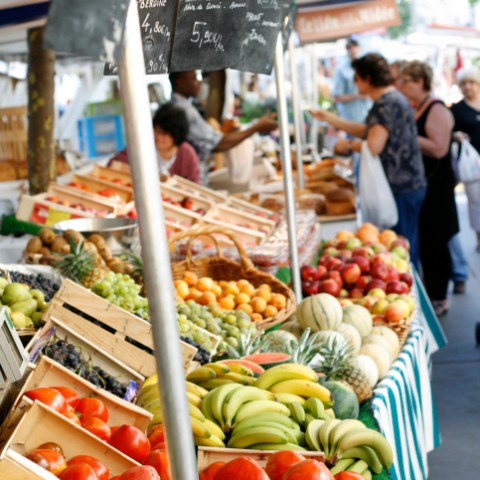
18- Toward – към (kam)
To go toward something is to go in its direction and get closer to it. This word can often appear in a sentence with ‘straight ahead’, as in:
“Go straight ahead, toward the park.”
If you’ve come to Bulgaria to teach English, you might have to ask someone how to find your new school. Depending on what town you’re in, you could simply head toward the residential area at lunch time. You’ll see (and probably hear) the primary school soon enough – it will be the big fenced building with all the kids running around the yard!
19- Facing – изправен пред (izpraven pred)
If you look at yourself in a mirror, you’ll be facing your reflection. In other words: you and your reflection look directly at each other. Many plush hotels are ocean-facing or river-facing, meaning the main entrance is pointed directly at the water, and the beach out front faces the hotel.
20- Beside – до (do)
I know of a special little place where there’s a gym right beside a river. You can watch the sun go down over the water while working out – it’s amazing. What’s more, you can park your scooter beside the building and it will still be there when you come out.
21- Corner – ъгъл (agal)
I love a corner when it comes to directions. A street corner is where two roads meet at an angle – often 90 degrees – making it easier to find than a location on a straight plane.
“Which building is the piano teacher in, sir?”
“Oh, that’s easy – it’s the one on the corner.”
The key to a corner is that it leads in two directions. It could form a crossroads, a huge intersection, or it could be the start of a tiny one-way cobblestone street with hidden treasures waiting in the shadow of the buildings.
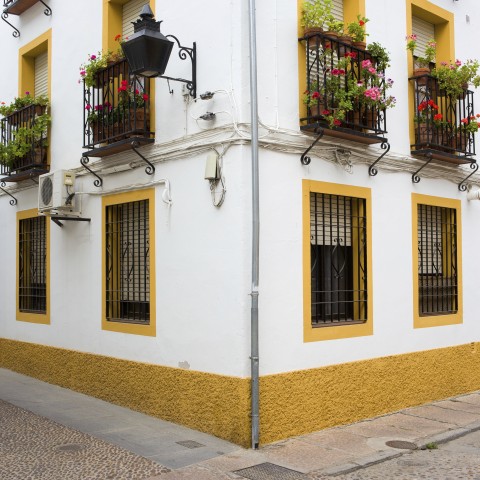
22- Distant – далечен (dalechen)
When a location is distant, it’s in an outlying area. This Bulgarian word refers to the remoteness of the site, not to how long it takes to get there. For that reason, it’s a very good idea to write the directions down, rather than try to memorize them in Bulgarian. Even better, get a Bulgarian person to write them down for you. This may seem obvious, but always include the location of your starting point! Any directions you’re given will be relative to the exact place you’re starting from.
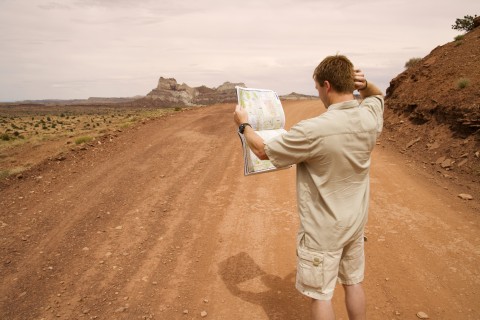
23- Close – близък (blizak)
This word is always a good one to hear when you have your heart set on a very relaxing day in the sun. It means there’s only a short distance to travel, so you can get there in a heartbeat and let the tanning commence. Remember to grab your Nook Book – learning is enhanced when you’re feeling happy and unencumbered. Being close to ‘home’ also means you can safely steal maximum lazy hours and leave the short return trip for sunset!
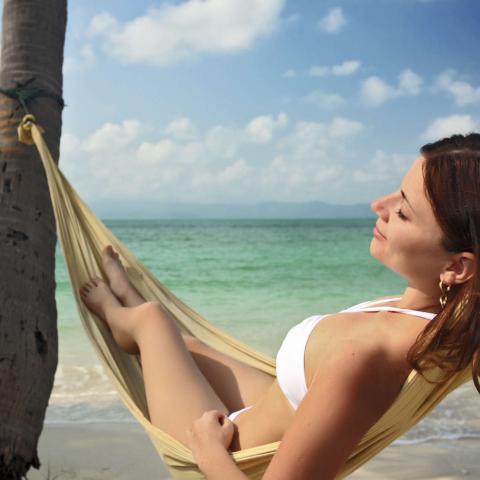
24- Surrounding – заобикалящ (zaobikalyasht)
If something is surrounding you, it is on every side and you are enclosed by it – kind of like being in a boat. Of course, we’re not talking about deep water here, unless you’re planning on going fishing. Directions that include this word are more likely to refer to the surrounding countryside, or any other features that are all around the place you’re looking for.

25- All sides – от всички страни (ot vsichki strani)
Another useful descriptive Bulgarian term to know is ‘all sides’. It simply means that from a particular point, you will be able to see the same features to the front, back and sides of you. It doesn’t necessarily imply you’ll be completely surrounded, just more-or-less so. Say, for example, you’re visiting the winelands for the day. When you get there, you’ll see vineyards on all sides of you. How stunning! Don’t neglect to sample the local wines – obviously.
26- Next to – в съседство с (v sŭsedstvo s)
The person giving you directions is probably standing next to you. The place being described as ‘next to’ something is in a position immediately to one side of it. It could refer to adjoining buildings, neighbouring stores, or the one-legged beggar who sits next to the beautiful flower vendor on weekdays. ‘Next to’ is a great positional term, as everything is next to something!
“Excuse me, Ma’am. Where is the train station?”
“It’s that way – next to the tourist market.”
27- Above – над (nad)
This is the direction you’ll be looking at if you turn your head upwards. Relative to where your body is, it’s a point higher than your head. If you’re looking for the location of a place that’s ‘above’ something, it’s likely to be on at least the first floor of a building; in other words, above another floor.
‘Above’ could also refer to something that will be visible overhead when you get to the right place. For example, the road you’re looking for might have holiday decorations strung up from pole to pole above it. In the cities, this is very likely if there’s any kind of festival going on.

28- Under – под (nagore)
Under is the opposite of above, and refers to a place that lies beneath something else. In the case of directions in Bulgarian, it could refer to going under a bridge – always a great landmark – or perhaps through a subway. In some parts of the world, you can even travel through a tunnel that’s under the sea!
Of course, you might just be missing your home brew and looking for an awesome coffee shop that happens to be under the very cool local gym you were also looking for. Nice find!
2. Getting directions in Bulgarian
The quickest and easiest way to find out how to get where you’re going is simply to ask someone. Most people on the streets of Bulgaria won’t mind being asked at all and will actually appreciate your attempt to ask directions in Bulgarian. After all, most tourists are more inclined to ask in their own language and hope for the best. How pedestrian is that, though?

I know, I know – you normally prefer to find your own way without asking. Well, think of it like this: you obviously need to practice asking questions in Bulgarian as much as you need to practice small talk, counting, or ordering a beer. Since you can’t very well ask a complete stranger if they would please help you count to five hundred, you’ll have to stick with asking directions!
We spoke earlier about body relative directions and these tend to be the ones we use most. For example:
“Turn left.”
“Go straight.”
“Turn right.”
Remember, too, that your approach is important. Many people are wary of strangers and you don’t want to scare them off. It’s best to be friendly, direct and get to the point quickly. A simple ‘Hi, can you help me?” or “Excuse me, I’m a bit lost,” will suffice. If you have a map in your hand, even better, as your intentions will be clear.
The bottom line is that if you want to find your way around Bulgaria with ease, it’s a good idea to master these basic phrases. With a little practice, you can also learn how to say directions in Bulgarian. Before you know it, you’ll be the one explaining the way!
3. Conclusion
Now that you have over thirty new directional phrases you can learn in Bulgarian, there’s no need to fear losing your way when you hit the streets of Bulgaria. All you need is a polite approach and your own amazing smile, and the locals will be excited to help you. It’s a chance for them to get better at explaining things to a foreigner, too. Most will enjoy that!
I advise keeping a few things handy in your day pack: a street map, a highlighter, a small notebook and pen, and your Bulgarian phrasebook. It would be useful to also have the Bulgarian WordPower app installed on your phone – available for both iPhone and Android.
Here’s a quick challenge to get you using the new terms right away. Can you translate these directions into Bulgarian?
“It’s close. Go straight ahead to the top of the hill and turn left at the corner. The building is on the right, opposite a small bus stop.”
You’re doing amazingly well to have come this far! Well done on tackling the essential topic of ‘directions’ – it’s a brave challenge that will be immensely rewarding. Trust me, when you’re standing at a beautiful location that you found just by knowing what to ask in Bulgarian, you’re going to feel pretty darn good.
If you’re as excited as I am about taking Bulgarian to an even deeper level, we have so much more to offer you. Did you know that we’ve already had over 1 billion lesson downloads? I know – we’re blown away by that, too. It’s amazing to be bringing the world’s languages to people who are so hungry for learning. Let me share some of our best options for you:
- If you haven’t done so already, grab your free lifetime account as a start. You’ll get audio and video lessons, plus vocabulary building tools.
- My favorite freebie is the word of the day, which will arrive in your inbox every morning. Those are the words I remember best!
- Start listening to Bulgarian music. I’m serious – it really works to make the resistant parts of the brain relax and accept the new language. Read about it here for some tips.
- If you enjoy reading, we have some great iBooks for your daily commute.
- If you have a Kindle and prefer to do your reading on a picnic blanket, there are over 6 hours of unique lessons in Bulgarian for you right there.
That’s it for today! Join BulgarianPod101 to discover many more ways that we can offer you a truly fun and enriching language learning experience. Happy travels!

Essential Vocabulary for Life Events in Bulgarian
What is the most defining moment you will face this year? From memories that you immortalize in a million photographs, to days you never wish to remember, one thing’s for certain: big life events change you. The great poet, Bukowski, said, “We are here to laugh at the odds and live our lives so well, that death will tremble to take us.” The older I get, the more I agree with him!
Talking about significant events in our lives is part of every person’s journey, regardless of creed or culture. If you’re planning to stay in Bulgaria for more than a quick visit, you’re sure to need at least a few ‘life events’ phrases that you can use. After all, many of these are shared experiences, and it’s generally expected that we will show up with good manners and warm wishes.

Table of Contents
1. Life Events
Do you know how to say “Happy New Year” in Bulgarian? Well, the New Year is a pretty big deal that the whole world is in on! We celebrate until midnight, make mindful resolutions, and fill the night sky with the same happy words in hundreds of languages. No doubt, then, that you’ll want to know how to say it like a local!
Big life events are not all about fun times, though. Real life happens even when you’re traveling, and certain terminology will be very helpful to know. From talking about your new job to wishing your neighbors “Merry Christmas” in Bulgarian, here at BulgarianPod101, we’ve put together just the right vocabulary and phrases for you.
1- Birthday – рожден ден (rozhden den)
If you’re like me, any excuse to bring out a pen and scribble a note is a good one. When there’s a birthday, even better: hello, handwriting!
Your Bulgarian friend will love hearing you wish them a “Happy birthday” in Bulgarian, but how much more will they appreciate a thoughtful written message? Whether you write it on their Facebook wall or buy a cute card, your effort in Bulgarian is sure to get them smiling! Write it like this:
Честит Рожден ден
Chestit Rozhden den
Now that you know the words, I challenge you to put them to music and sing your own “Happy birthday” song in Bulgarian! It’s not impossible to figure out even more lyrics, once you start discovering the language from scratch.
2- Buy – купувам (kupuvam)
If there’s a special occasion, you might want to buy somebody a gift. As long as you’ve checked out Bulgarian etiquette on gift-giving (do a Google search for this!), it will be a lovely gesture. If you’re not sure what to buy, how about the awesome and universally-appealing gift of language? That’s a gift that won’t stop giving!
3- Retire – пенсионирам се (pensioniram se)
If you’re planning to expand your mind and retire in Bulgaria, you can use this word to tell people why you seem to be on a perpetual vacation!
Retirement is also a great time to learn a new language, don’t you think? And you don’t have to do it alone! These days it’s possible to connect to a vibrant learning community at the click of a button. The added benefit of a Daily Dose of Language is that it keeps your brain cells alive and curious about the world. After all, it’s never too late to realize those long-ignored dreams of traveling the globe…
4- Graduation – дипломиране (diplomirane)
When attending a graduation ceremony in Bulgaria, be prepared for a lot of formal language! It will be a great opportunity to listen carefully and see if you can pick up differences from the everyday Bulgarian you hear.
5- Promotion – повишение (povishenie)
Next to vacation time, receiving a promotion is the one career highlight almost everyone looks forward to. And why wouldn’t you? Sure, it means more responsibility, but it also means more money and benefits and – the part I love most – a change of scenery! Even something as simple as looking out a new office window would boost my mood.
6- Anniversary – годишнина (godishnina)
Some anniversaries we anticipate with excitement, others with apprehension. They are days marking significant events in our lives that can be shared with just one person, or with a whole nation. Whether it’s a special day for you and a loved one, or for someone else you know, this word is crucial to know if you want to wish them a happy anniversary in Bulgarian.
7- Funeral – погребение (pogrebenie)
We tend to be uncomfortable talking about funerals in the west, but it’s an important conversation for families to have. Around the world, there are many different customs and rituals for saying goodbye to deceased loved ones – some vastly different to our own. When traveling in Bulgaria, if you happen to find yourself the unwitting observer of a funeral, take a quiet moment to appreciate the cultural ethos; even this can be an enriching experience for you.
8- Travel – пътувам (patuvam)
Travel – my favorite thing to do! Everything about the experience is thrilling and the best cure for boredom, depression, and uncertainty about your future. You will surely be forever changed, fellow traveler! But you already know this, don’t you? Well, now that you’re on the road to total Bulgarian immersion, I hope you’ve downloaded our IOS apps and have your Nook Book handy to keep yourself entertained on those long bus rides.
9- Graduate – завършвам (zavarshvam)
If you have yet to graduate from university, will you be job-hunting in Bulgaria afterward? Forward-looking companies sometimes recruit talented students who are still in their final year. Of course, you could also do your final year abroad as an international student – an amazing experience if you’d love to be intellectually challenged and make a rainbow of foreign friends!
10- Wedding – сватба (svatba)
One of the most-loved traditions that humans have thought up, which you’ll encounter anywhere in the world, is a wedding. With all that romance in the air and months spent on preparations, a wedding is typically a feel-good affair. Two people pledge their eternal love to each other, ladies cry, single men look around for potential partners, and everybody has a happy day of merrymaking.
Ah, but how diverse we are in our expression of love! You will find more wedding traditions around the world than you can possibly imagine. From reciting love quotes to marrying a tree, the options leave no excuse to be boring!
11- Move – премествам се (premestvam se)
I love Bulgaria, but I’m a nomad and tend to move around a lot, even within one country. What are the biggest emotions you typically feel when moving house? The experts say moving is a highly stressful event, but I think that depends on the circumstances. Transitional periods in our lives are physically and mentally demanding, but changing your environment is also an exciting adventure that promises new tomorrows!
12- Be born – роден (roden)
I was not born in 1993, nor was I born in Asia. I was born in the same year as Aishwarya Rai, Akon, and Monica Lewinsky, and on the same continent as Freddy Mercury. When and where were you born? More importantly – can you say it in Bulgarian?
13- Get a job – намирам работа (namiram rabota)
The thought of looking for a job in a new country can be daunting, but English speakers are in great demand in Bulgaria – you just have to do some research, make a few friends and get out there! Also, arming yourself with a few Bulgarian introductions that you can both say and write will give you a confidence boost. For example, can you write your name in Bulgarian?
14- Die – умирам (umiram)
Death is a universal experience and the final curtain on all other life events. How important is it, then, to fully live before we die? If all you have is a passport, a bucket list, and a willingness to learn some lingo, you can manifest those dreams!
15- Home – дом (dom)
If home is where the heart is, then my home is on a jungle island completely surrounded by the turquoise ocean. Right now, though, home is an isolation room with a view of half a dry palm tree and a tangle of telephone wires.
If you’re traveling to Bulgaria for an extended stay, you’ll soon be moving into a new home quite unlike anything you’ve experienced before!
16- Job – работа (rabota)
What job do you do? Does it allow you much time for travel, or for working on this fascinating language that has (so rightfully) grabbed your attention? Whatever your job, you are no doubt contributing to society in a unique way. If you’re doing what you love, you’re already on the road to your dream. If not, just remember that every single task is one more skill to add to your arsenal. With that attitude, your dream job is coming!
17- Birth – раждане (razhdane)
Random question: do you know the birth rate of Bulgaria?
If you’re lucky enough to be invited to see a friend’s baby just after they are born, you’ll have all my respect and all my envy. There is nothing cuter! Depending on which part of the country you’re in, you may find yourself bearing witness to some pretty unexpected birth customs. Enjoy this privilege!
18- Engaged – сгодявам се (sgodyavam se)
EE Cummings said, “Lovers alone wear sunlight,” and I think that’s most true at the moment she says “yes.” Getting engaged is something young girls dream of with stars in their eyes, and it truly is a magical experience – from the proposal, to wearing an engagement ring, to the big reveal!
In the world of Instagram, there’s no end to the antics as imaginative couples try more and more outrageous ways to share their engagement with the world. I love an airport flashmob, myself, but I’d rather be proposed to on a secluded beach – salt, sand, and all!
Engagement customs around the world vary greatly, and Bulgaria is no exception when it comes to interesting traditions. Learning their unique romantic ways will inspire you for when your turn comes.
Speaking of romance, do you know how to say “Happy Valentine’s Day” in Bulgarian?
19- Marry – женя (zhenya)
The one you marry will be the gem on a shore full of pebbles. They will be the one who truly mirrors your affection, shares your visions for the future, and wants all of you – the good, the bad and the inexplicable.
From thinking up a one-of-a-kind wedding, to having children, to growing old together, finding a twin flame to share life with is quite an accomplishment! Speaking of which…
2. Marriage Proposal Lines
Ah, that heart-stopping moment when your true love gets down on one knee to ask for your hand in marriage, breathlessly hoping that you’ll say “Yes!” If you haven’t experienced that – well, it feels pretty darn good, is all I can say! If you’re the one doing the asking, though, you’ve probably had weeks of insomnia agonizing over the perfect time, location and words to use.
How much more care should be taken if your love is from a different culture to yours? Well, by now you know her so well, that most of it should be easy to figure out. As long as you’ve considered her personal commitment to tradition, all you really need is a few words from the heart. Are you brave enough to say them in Bulgarian?
3. Talking About Age
Part of the wonder of learning a new language is having the ability to strike up simple conversations with strangers. Asking about age in this context feels natural, as your intention is to practice friendly phrases – just be mindful of their point of view!
When I was 22, I loved being asked my age. Nowadays, if someone asks, I say, “Well, I’ve just started my fifth cat life.” Let them ponder that for a while.
In Bulgaria, it’s generally not desirable to ask an older woman her age for no good reason, but chatting about age with your peers is perfectly normal. Besides, you have to mention your birthday if you want to be thrown a birthday party!
4. Conclusion
Well, there you have it! With so many great new Bulgarian phrases to wish people with, can you think of someone who has a big event coming up? If you want to get even more creative, BulgarianPod101 has much to inspire you with – come and check it out! Here’s just some of what we have on offer at BulgarianPod101:
- Free Resources: Sharing is caring, and for this reason, we share many free resources with our students. For instance, start learning Bulgarian with our basic online course by creating a lifetime account – for free! Also get free daily and iTunes lessons, free eBooks, free mobile apps, and free access to our blog and online community. Or how about free Vocabulary Lists? The Bulgarian dictionary is for exclusive use by our students, also for free. There’s so much to love about BulgarianPod101…!
- Innovative Learning Tools and Apps: We make it our priority to offer you the best learning tools! These include apps for iPhone, iPad, Android and Mac OSX; eBooks for Kindle, Nook, and iPad; audiobooks; Roku TV and so many more. This means that we took diverse lifestyles into account when we developed our courses, so you can learn anywhere, anytime on a device of your choice. How innovative!
- Live Hosts and One-on-One Learning: Knowledgeable, energetic hosts present recorded video lessons, and are available for live teaching experiences if you upgrade. This means that in the videos, you get to watch them pronounce those tongue-twisters, as if you’re learning live! Add octane to your learning by upgrading to Premium Plus, and learn two times faster. You can have your very own Bulgarian teacher always with you, ensuring that you learn what you need, when you need to – what a wonderful opportunity to master a new language in record time!
- Start Where You Are: You don’t know a single Bulgarian word? Not to worry, we’ve absolutely got this. Simply enroll in our Absolute Beginner Pathway and start speaking from Lesson 1! As your learning progresses, you can enroll in other pathways to match your Bulgarian level, at your own pace, in your own time, in your own place!
Learning a new language can only enrich your life, and could even open doors towards great opportunities! So don’t wonder if you’ll regret enrolling in BulgarianPod101. It’s the most fun, easy way to learn Bulgarian.

Talk About the Weather in Bulgarian Like a Native
Did you know that every minute of the day, one billion tons of rain falls on the earth? Hard to believe, considering the climate crisis! Of course, all that rain is not equally shared across the planet.
So, would you mention this fascinating fact to your new Bulgarian acquaintance? Well, small talk about local weather is actually a great conversation-starter. Everyone cares about the weather and you’re sure to hear a few interesting opinions! Seasons can be quite unpredictable these days and nobody knows the peculiarities of a region better than the locals.
BulgarianPod101 will equip you with all the weather vocabulary you need to plan your next adventure. The weather can even be an important discussion that influences your adventure plans. After all, you wouldn’t want to get caught on an inflatable boat with a two-horsepower motor in Hurricane Horrendous!

Table of Contents
- Talking about the weather in Bulgaria
- Words for the first day of spring
- Do You Know the Essential Summer Vocabulary?
- Must-Know Autumn vocabulary
- Winter
- BulgarianPod101 can prepare you for any season.
1. Talking about the weather in Bulgaria
If you’re like me, your day’s activity plan is likely to begin with a strong local coffee and a chat about what the sky is doing. After all, being prepared could be the difference between an amazing day and a miserable one! Luckily, it’s not difficult to comment on Bulgarian weather – just start with these simple words and phrases.
1- The rain is falling on the street – Дъждът пада на улицата (Dazhdat pada na ulitsata).
Watercolor artists, take out your paints! You might not be able to venture out on foot today, but just embrace the rain as part of your Bulgarian experience. When the rain stops, the air will be clean and colours vibrant.
2- The snow has covered everything – Снегът покрива всичко (Snegat pokriva vsichko).
A fresh blanket of snow is irresistibly beautiful. Pull on your boots and beanie, and leave your tracks in this foreign landscape. Don’t resist the urge to build a snowman – you need this!
3- Fluffy cloud – пухкав облак (puhkav oblak)
When you’re waiting for a warm beach day, fluffy white clouds in a blue sky are a good sign. Don’t forget your sunscreen, as clouds will intensify the UV rays hitting your skin.
4- The water froze on the glass – Водата замръзна на стъклото (Vodata zamrazna na stakloto).
Night temperatures can get chilly and might freeze the condensation on your windows. A good way to clear them up is with warm salt water.
5- The heavy rain could cause flash flooding – Този порой може да причини светкавично наводнение (Tozi poroy mozhe da prichini svetkavichno navodnenie).
If you’re visiting Bulgaria in the wet season, it’s important to stay informed when heavy rain sets in, so keep an eye on the weather radar. Avoid river activities and rather spend this time making a home-cooked meal and brushing up on your Bulgarian weather words.
6- Flood – наводнение (navodnenie)
If you do get caught in a flood, your destination should no longer be ‘home’, but the nearest high ground.
7- The typhoon has hit – Тайфунът удари (Tayfunat udari).
Not all countries experience typhoons, but you need to know when to prepare for one! It will be very scary if you’ve never experienced one before. Your local neighbours are the best people to advise you on where to take shelter, as they’ve been doing it for generations. Be sure to get the low-down at the first sign of rough weather!
8- Check the weather report before going sailing – Провери прогнозата за времето преди да отплаваш (Proveri prognozata za vremeto predi da otplavash).
When planning an outdoor activity, especially on a body of water, always be prepared for a change in the weather. Ask your hotel receptionist or neighbour where you can get a reliable daily weather report, and don’t forget your sweater!
9- Today’s weather is sunny with occasional clouds – Времето днес е слънчево с краткотрайни облаци (Vremeto dnes e slanchevo s kratkotrayni oblatsi).
Sunny weather is the dream when traveling in Bulgaria! Wake up early, pack the hats and sunblock and go and experience the terrain, sights and beautiful spots. You’ll be rewarded with happy vibes all around.
10- A rainy day – дъждовен ден (dazhdoven den)
Remember when you said you’d save the Bulgarian podcasts for a rainy day? Now’s that day!
11- Scenic rainbow – живописна дъга (zhivopisna daga)
The best part about the rain is that you can look forward to your first rainbow in Bulgaria. There’s magic in that!
12- Flashes of lightning can be beautiful, but are very dangerous – Просветванията на мълнията може да са красиви, но са много опасни (Prosvetvaniyata na malniyata mozhe da sa krasivi, no sa mnogo opasni).
Lightning is one of the most fascinating weather phenomena you can witness without really being in danger – at least if you’re sensible and stay indoors! Did you know that lightning strikes the earth 40-50 times per second? Fortunately, not all countries experience heavy electric storms!
13- 25 degrees Celsius – двадесет и пет градуса по Целзий (dvadeset i pet gradusa po Tselziy)
Asking a local what the outside temperature will be is another useful question for planning your day. It’s easy if you know the Bulgarian term for ‘degrees Celsius’.
14- Fahrenheit – Фаренхайт (Farenhayt)
Although the Fahrenheit system has been replaced by Celsius in almost all countries, it’s still used in the US and a few other places. Learn this word in Bulgarian in case one of your companions develops a raging fever in one of those places.
15- Today the sky is clear – Днес небето е ясно (Dnes nebeto e yasno).
Clear skies mean you’ll probably want to get the camera out and capture some nature shots – not to mention the great sunsets you’ll have later on. Twilight can lend an especially magical quality to a landscape on a clear sky day, when the light is not filtered through clouds.
16- Light drizzle – лек ситен дъждец (lek siten dazhdets)
Days when it’s drizzling are perfect for taking in the cultural offerings of Bulgaria. You could go to the mall and watch a Bulgarian film, visit museums and art galleries, explore indoor markets or even find the nearest climbing wall. Bring an umbrella!
17- Temperature – температура (temperatura)
Because of the coronavirus, many airports are conducting temperature screening on passengers. Don’t worry though – it’s just a precaution. Your temperature might be taken with a no-touch thermometer, which measures infrared energy coming off the body.
18- Humid – влажен (vlazhen)
I love humid days, but then I’m also a water baby and I think the two go
together like summer and rain. Find a pool or a stream to cool off in – preferably in the shade!
19- With low humidity the air feels dry – При ниска влажност въздухът се чувства сух (Pri niska vlazhnost vazduhat se chuvstva suh).
These are the best days to go walking the hills and vales. Just take at least one Bulgarian friend with you so you don’t get lost!
20- The wind is really strong – Вятърът е наистина силен (Vyatarat e naistina silen).
A strong wind blows away the air pollution and is very healthy in that respect. Just avoid the mountain trails today, unless you fancy being blown across the continent like a hot air balloon.
21- It’s windy outside – Навън е ветровито (Navan e vetrovito).
Wind! My least favourite weather condition. Of course, if you’re a kitesurfer, a windy day is what you’ve been waiting for!
22- Wet roads can ice over when the temperature falls below freezing – Мокрите пътища могат да се заледят, когато температурата падне под замръзване (Mokrite patishta mogat da se zaledyat, kogato temperaturata padne pod zamrazvane).
The roads will be dangerous in these conditions, so please don’t take chances. The ice will thaw as soon as the sun comes out, so be patient!
23- Today is very muggy – Днес е много задушно (Dnes e mnogo zadushno).
Muggy days make your skin feel sticky and sap your energy. They’re particular to high humidity. Cold shower, anyone? Ice vest? Whatever it takes to feel relief from the humidity!
24- Fog – мъгла (magla)
Not a great time to be driving, especially in unknown territory, but keep your fog lights on and drive slowly.
25- Hurricane – ураган (uragan)
Your new Bulgarian friends will know the signs, so grab some food and candles and prepare for a night of staying warm and chatting about wild weather in Bulgaria.
26- Big tornado – голямо торнадо (golyamo tornado)
If you hear these words, it will probably be obvious already that everyone is preparing for the worst! Definitely do whatever your accommodation hosts tell you to do when a tornado is expected.
27- It’s cloudy today – Днес е облачно (Dnes e oblachno).
While there won’t be any stargazing tonight, the magnificent clouds over Bulgaria will make impressive photographs. Caption them in Bulgarian to impress your friends back home!
28- Below freezing temperatures – температури под нулата (temperaturi pod nulata)
When the temperature is below freezing, why not take an Uber and go shopping for some gorgeous Bulgarian winter gear?
29- Wind chill is how cold it really feels outside – Вятърното охлаждане е колко студено се чувства навън (Vyatarnoto ohlazhdane e kolko studeno se chuvstva navan).
Wind doesn’t change the ambient temperature of the air, it just changes your body temperature, so the air will feel colder to you than it actually is. Not all your Bulgarian friends will know that, though, so learn this Bulgarian phrase to sound really smart!
30- Water will freeze when the temperature falls below zero degrees celsius – Водата ще замръзне, когато температурата падне под нула градуса по Целзий (Vodata shte zamrazne, kogato temperaturata padne pod nula gradusa po Tselziy).
If you’re near a lake, frozen water is good news! Forgot your ice skates? Don’t despair – find out where you can hire some. Be cautious, though: the ice needs to be at least four inches thick for safe skating. Personally, I just slide around on frozen lakes in my boots!
31- Waiting to clear up – чакам да се изясни (chakam da se izyasni)
Waiting for the weather to clear up so you can go exploring is frustrating, let’s be honest. That’s why you should always travel with two things: a scintillating novel and your Bulgarian Nook Book.
32- Avoid the extreme heat – избягвам горещината (izbyagvam goreshtinata)
Is the heat trying to kill you? Unless you’re a hardened heatwave hero, definitely avoid activity, stay hydrated and drink electrolytes. Loose cotton or linen garb is the way to go!
33- Morning frost – сутрешна слана (sutreshna slana)
Frost is water vapour that has turned to ice crystals and it happens when the earth cools so much in the night, that it gets colder than the air above it. Winter is coming!
34- Rain shower – преваляване от дъжд (prevalyavane ot dazhd)
Rain showers are typically brief downpours that drench the earth with a good drink of water.
35- In the evening it will become cloudy and cold – Привечер ще се заоблачи и ще застудее (Privecher shte se zaoblachi i shte zastudee).
When I hear this on the Bulgarian weather channel, I buy a bottle of wine (red, of course) and wood for the fireplace. A cold and cloudy evening needs its comforts!
36- Severe thunderstorm – силна гръмотевична буря (silna gramotevichna burya)
Keep an eye on the Bulgarian weather maps if it looks like a big storm is coming, so you’ll be well-informed.
37- Ice has formed on the window – Образувал се е лед на прозореца (Obrazuval se e led na prozoretsa).
You could try this phrase out on the hotel’s helpful cleaning staff, or fix the problem yourself. Just add a scoop or two of salt to a spray bottle of water – that should work!
38- Large hailstones – големи парчета град (golemi parcheta grad)
As a kid, I found hail crazy exciting. Not so much now – especially if I’m on the road and large hailstones start pummeling my windscreen!
39- Thunder – гръмотевица гръмотевица (gramotevitsa)
The rumble of rolling thunder is that low-volume, ominous background sound that goes on for some time. It’s strangely exciting if you’re safely in your hotel room; it could either suddenly clear up, or escalate to a storm.
40- Sleet – суграшица (sugrashitsa)
Sleet is tiny hard pieces of ice made from a mixture of rain and melted snow that froze. It can be messy, but doesn’t cause major damage the way hail does. Pretty cool to know this word in Bulgarian!
2. Words for the first day of spring
You know the feeling: your heart skips a beat when you wake up and spring has sprung! Spring will reward you with new blossoms everywhere, birdsong in the air, kittens being born in the neighborhood and lovely views when you hit the trails. Pack a picnic and ask a new Bulgarian friend to show you the more natural sights. Don’t forget a light sweater and a big smile. This is the perfect time to practice some Bulgarian spring words!
3. Do You Know the Essential Summer Vocabulary?
Summer! Who doesn’t love that word? It conjures up images of blue skies, tan skin, vacations at the beach and cruising down the coast in an Alfa Romeo, sunglasses on and the breeze in your hair. Of course, in Bulgaria there are many ways to enjoy the summer – it all depends on what you love to do. One thing’s for sure: you will have opportunities to make friends, go on picnics, sample delicious local ice-cream and maybe even learn to sing some Bulgarian songs. It’s up to you! Sail into Bulgarian summer with this summer vocab list, and you’ll blend in with ease.
4. Must-Know Autumn vocabulary
Victoria Ericksen said, “If a year was tucked inside of a clock, then autumn would be the magic hour,” and I agree. Who can resist the beauty of fall foliage coloring the Bulgarian landscape? Birds prepare to migrate; travelers prepare to arrive for the best weather in Bulgaria.
The autumnal equinox marks the moment the Sun crosses the celestial equator, making day and night almost equal in length. The cool thing about this event is that the moon gets really bright – the ‘harvest moon’, as it’s traditionally known.
So, as much as the change of season brings more windy and rainy days, it also brings celebration. Whether you honor Thanksgiving, Halloween or the Moon Festival, take some time to color your vocabulary with these Bulgarian autumn words.
5. Winter
Winter is the time the natural world slows down to rest and regroup. I’m a summer girl, but there are fabulous things about winter that I really look forward to. For one, it’s the only season I get to accessorize with my gorgeous winter gloves and snug down coat!
Then, of course, there’s ice skating, holiday decorations and bonfires. As John Steinbeck said, “What good is the warmth of summer, without the cold of winter to give it sweetness?” Get ready for the cold season with our list of essential Winter words!
6. BulgarianPod101 can prepare you for any season.
Now that you know how to inquire and comment on the weather in Bulgaria, you
can confidently plan your weather-ready travel itinerary. How about this for an idea: the next
time you’re sitting in a Bulgarian street café, try asking someone local this question:
“Do you think the weather will stay like this for a few days?” If you loved learning these cool Bulgarian weather phrases with us, why not take it a step further and add to your repertoire? BulgarianPod101 is here to help!

Bulgarian National TV Show Review: Make Learning Fun Again!
These days, science says that having fun while learning is the most effective way to memorize a foreign language. This can be explained by the increased levels of oxygen, dopamine, and endorphins one experiences while being entertained. A great example of this is how little kids can learn a foreign language—or even their own—by watching their favorite cartoons. The shows on Bulgarian live TV channels can help you naturally learn Bulgarian vocabulary and figure out how to combine specific words and phrases.
Watching Bulgarian television shows for just one hour a day is enough to start seeing progress in your language skills. Even if you don’t understand all that’s said on your favorite Bulgarian TV series or shows, don’t give up! Keep watching them daily, and you’ll start to understand more and more. Using Bulgarian TV programs as an auxiliary learning method will definitely accelerate your progress.
Further, watching Bulgarian TV shows will allow you to better understand Bulgarian pop culture and society, and help you get used to hearing certain idioms!
So, are you ready to make your Bulgarian-learning experience much more fun? BulgarianPod101 can direct you to the best Bulgarian TV shows for you based on what you’re most interested in. Keep reading this Bulgarian National TV show review to find out more.

Table of Contents
- Introduction to the most popular Bulgarian TV shows
- Famous Bulgarian Humoristic Shows
- Popular Bulgarian Political Show
- Popular Bulgarian Entertainment Show
- Famous Bulgarian Culinary Shows
- Popular Bulgarian Family Show
- Popular Bulgarian Adventure Series
- Popular Bulgarian Sports Show
- How BulgarianPod101 can help you improve your Bulgarian language skills?
1. Introduction to the Most Popular Bulgarian TV Shows
There are multiple Bulgarian TV shows available online for you to watch based on your preferences. Choose the genre you’re most interested in, as this will allow you to get used to the specific terminology faster. When you think you’ve mastered a big portion of it, you can choose a TV show from another genre. In this article, BulgarianPod101 will provide you with suggestions for the best Bulgarian TV shows in the following genres:
- Comedy
- Culinary
- Entertainment
- Adventure
- Political
- Sports
- Family
-
→ You can start learning Bulgarian TV vocabulary right now by studying this Bulgarian vocabulary list dedicated to World Television Day.
2. Famous Bulgarian Comedy Shows
If you like comedies and funny TV shows, then these top TV shows in Bulgarian are just for you!
Lords of the Air
Its Bulgarian name is Господари на ефира (Gospodari na efira). This is a humorous show that’s mainly dedicated to replaying mistakes or blunders that were made on other Bulgarian TV channels. Watching this show will help you learn the difference between Bulgarian words that sound similar to each other (like paronyms), as it reveals multiple lapsuses that different television personalities have made.
Some of the famous Bulgarian comedians featured on this show include Vasil Vasilev-Zueka, Dimitar Rachkov, Ruslan Maynov, Georgi Mamalev, and Maria Ignatova.
Commonly used words and phrases in The Lords of the Air (Господари на ефира) include:
- Гаф (Gaph) — “Boner”
- Гафове (Gaphove) — “Boners”
- Смях до скъсване (Smyah do skasvane) — “Laughing to tears”
- Репортажи (Reportazhi) — “Reportages”
- Златен скункс (Zlaten skunks) — “Golden Skunk”
- This is a statuette given to people who made a big public blunder.
- Бяла лястовица (Byala lyastovitsa) — “White Swallow”
- This is a statuette given as an award to people who did something important, like saving someone’s life or winning a world competition.
- Гледам и не вярвам на ушите си (Gledam i ne vyarvam na ushite si) — “I am watching and I can’t believe my ears.”
- Изспортен свят (Izsporten svyat) — This is a wordplay that combines the two words “worn out” and “sports world.”
- Адреналинки (Adrenalinki) — “Attractive Adrenaline Girls”
Ready to start watching some of the Lords of the Air series?
The Comedians
The Bulgarian TV show The Comedians, or Комиците (Komicite), is among the funniest and most popular BTV Bulgarian TV shows. Typically, it consists of jokes about popular Bulgarian people who are usually invited as special guests and as participants on the show.
This live stream Bulgarian TV show continues for one-and-a-half hours and can be watched for free online. Viewers have fun with skits, songs, dances, and special performances that allow them to improve their Bulgarian language skills. Some of the best Bulgarian actors, singers, and showmen—including Lubomir Neykov, Krustyu Lafazanov, Hristo Garbov, Ruslan Maynov, and Nencho Ilchev—participate in this show.
Commonly used words and phrases in The Comedians (Комиците) include:
- Уважаеми зрители (Uvazhaemi zriteli) — “Dear viewers”
- Аплодисменти (Aplodismenti) — “Applause”
- Не превключвайте канала, дами и господа (Ne prevklyuchvayte kanala, dami i gospoda) — “Do not switch the channel, ladies and gentlemen.”
- Започват Комиците (Zapochvat Komitsite) — “The Comedians starts”
- Карък (Karak) — “a misfortuned person”
Why not get a taste of The Comedians series before making a decision?
The Channel Show
Its Bulgarian name is Шоуто на Канала (Shouto na Kanala), and this is another one of the best Bulgarian comedy TV shows. It reflects both the political and public events of the previous week, presenting them in a humorous style. This show combines satire, parody, skits, funny news, funny songs, and holiday concerts performed by the show’s small orchestra.
The main actors who take part in this show are Toncho Tokmakchiev, Stefan Shterev – Checho, and Kamen Vodenicharov. Special regular guests are Martina Vachkova and Georgi Mamalev.
Commonly used words and phrases in The Channel Show (Шоуто на Канала) include:
- Минути за поезия (Minuti za poeziya) — “Minutes for poetry”
- До следващата ни среща (Do sledvashtata ni sreshta) — “Until our next meeting”
- Поетично предаване (Poetichno predavane) — “Poetic telecast”
- Има нещо вярно (Ima neshto vyarno) — “There is something true.”
- Животът е голям човек (Zhivotat e golyam chovek) — “Life is a big man.”
- Аз съм професор Букварски (Az sam profesor Bukvarski) — “I’m Professor Bookvarsky.”
- From ABC Book
- Комисията за защита на потребителя (Komisiyata za zashtita na potrebitelya) — “Consumer Protection Commission”
- Аз съм вашият любим професор Дегустинов (Az sam vashiyat lyubim profesor Degustinov) — “I am your favorite Professor Degustinov.”
- From Taster
Ready to experience The Channel Show for yourself?
3. A Popular Bulgarian Political Show
Watching Bulgarian political shows will not only help you expand your vocabulary, but also better understand the political situation in Bulgaria. Moreover, along with the political news and discussions, viewers can get acquainted with famous Bulgarian people.
The Slavi’s Show
Its Bulgarian name is Шоуто на Слави (Shouto na Slavi), and this was an evening TV show hosted by Slavi Trifonov, a Bulgarian singer, TV presenter, and producer. This Bulgarian TV show started at the end of 2000 and lasted until July 31, 2019. Its guests were world-popular celebrities from show business, cinema, music, sports, literature, cultural figures, and even the Bulgarian political elite.
Commonly used words and phrases in The Slavi’s Show (Шоуто на Слави) include:
- Новинарник (Novinarnik) — a comic animated version of The Slavi’s Show short news
- Запознай се с малките (Zapoznaiy se s malkite) — “Meet the little ones”
- This is a section of the show featuring children.
- Лигата на необикновените (Ligata na neobiknovenite) — “The League of the Extraordinary”
- Celebrities sit in Slavi’s chair and have the right to host the show once.
- Достойни за уважение (Dostoyni za uvazhenie) — “Worthy of respect”
- These are people who have made someone’s life better.
- Гле’й как се пра’и (Gley kak se pray) — “Look how it should be done.”
- Нещо лично (Neshto lichno) — “Something personal”
- Celebrities tell stories from their lives.
- Питай Слави (Pitay Slavi) — “Ask Slavi”
- Лице назаем (Litse nazaem) — “Borrowed face”
- The show is hosted by celebrities who choose the topics and guests themselves.
Ready to see what The Slavi’s Show series is all about?
4. A Popular Bulgarian Entertainment Show
Are you more interested in general entertainment shows? Bulgarian television has a great one you’re sure to enjoy.
The Voice of Bulgaria
Its Bulgarian name is Гласът на България (Glasat na Balgariya), and this show is conducted the same way as The Voice in America. This is a TV music reality show that has three phases: Casting in the Dark, the Vocal Duels, and Live Concerts. The singers compete for the prestigious Voice of Bulgaria title.
Commonly used words and phrases in The Voice of Bulgaria (Гласът на България) include:
- Финалист (Finalist) — “Finalist”
- Вот на публиката (Vot na publikata) — “Audience vote”
- Победител (Pobeditel) — “Winner”
- Кастинг-записвания (Kasting-zapisvaniya) — “Casting recordings”
- Жури (Zhuri) — “Jury”
- Отбори (Otbori) — “Teams”
- Концерт на живо (Kontsert na zhivo) — “Live concert”
- Резултати (Rezultati) — “Results”
- Гласуване (Glasuvane) — “Voting”
- Честито (Chestito) — “Congratulations”
Watch some of The Voice of Bulgaria series to get a better idea of what to expect.
5. Famous Bulgarian Culinary Shows
Some people just love to learn different recipes and to impress their family with new dishes. If you like to cook, you can combine your favorite hobby with learning Bulgarian by watching the following famous Bulgarian culinary shows.
MasterChef
MasterChef, conducted in the form of a competition, became one of the most dramatic and fascinating TV shows in Bulgaria. The goal of this Bulgarian TV show is to find the best chefs in the country, so only the most talented, creative, and dedicated people with a passion for food take part in it.
This show has the power to turn amateurs into professionals, so it’s worth watching not only to learn Bulgarian culinary vocabulary but also to improve your cooking skills.
Commonly used words and phrases in MasterChef include:
- финалистите в шоуто (finalistite v shouto) — “the finalists in the show”
- рецепти (retsepti) — “recipes”
- гурме ястия (gurme yastiya) — “gourmet dishes”
- агнешки котлети (agneshki kotleti) — “lamb cutlets”
- Титлата MasterChef на България (titlata MasterChef na Balgariya) — “The MasterChef of Bulgaria Title”
You can watch some of the MasterChef series to see what you’re in for.
Bon Apeti
Its Bulgarian name is Бон Апети (Bon Apeti). This culinary show teaches you how to apply the most modern cooking techniques in your kitchen. Moreover, in addition to learning many Bulgarian traditional dishes, you’ll be able to learn about foreign cuisines, such as Middle East pilaf, Italian Stromboli sandwich, saffron ice cream, etc. The show presenter is Ivan Zvezdev.
Commonly used words and phrases in Bon Apeti include:
- средиземноморски вкус (sredizemnomorski vkus) — “Mediterranean taste”
- пъстърва на фурна (pastarva na furna) — “oven-baked trout”
- вкусни месни кюфтенца (vkusni mesni kyuftentsa) — “delicious meatballs”
- рецепта (retsepta) — “recipe”
- замразен грах (zamrazen grah) — “frozen peas”
- крем супа (krem supa) — “cream soup”
Ready to get a taste of Bon Apeti?
6. A Popular Bulgarian Family Show
It’s fun to watch how people choose their life partner from among multiple options. While you’re engrossed in intrigue and hope that your favorite contestant will win, you’ll learn many new Bulgarian words and phrases.
A Farmer is Looking for a Woman
Going by the Bulgarian name Фермер търси жена (Fermer tarsi zhena), this show follows several ladies as they try to win the heart of a farmer. At the end of the show, he should choose one of them to continue a relationship with. She should agree to live a country life away from the big cities and help him with all the farm work. The first show host was the famous Bulgarian actress Alexandra Sarchadzhieva.
Commonly used words and phrases in A Farmer is Looking for a Woman (Фермер търси жена) include:
- Влюбен фермер (Vlyuben fermer) — “Farmer in love”
- Финален избор (Finalen izbor) — “Final choice”
- Те избраха жените, с които искат да продължат живота си (Te izbraha zhenite, s koito iskat da prodalzhat zhivota si) — “They chose the women they wanted to continue their lives with.”
- Пътешествието на мечтите (Pateshestvieto na mechtite) — “The journey of dreams”
- Влюбени двойки (Vlyubeni dvoyki) — “Couples in love”
- Романтичен уикенд (Romantichen weekend) — “Romantic weekend”
See for yourself what Фермер търси жена is all about and get hooked!
7. A Popular Bulgarian Adventure Series
If you’re an adventurer who likes to travel to different countries, learn about the local culture and customs, meet new people, and see fascinating places, then you’ll definitely like watching an adventure series. Watching this kind of Bulgarian TV series will help you significantly improve your Bulgarian language skills in a variety of topics.
Without Luggage
Going by the Bulgarian name Без багаж (Bez bagazh), this series reveals different exotic places around the world. You’ll meet with the local people and learn more about their lifestyle, culture, and customs. Moreover, you’ll get to see the most exciting places, even if you don’t have the money for tickets!
Would you like to learn more about the rituals of Nkosi, South Africa, master the art of the Ndebele tribe, spend a few hours in Tokyo, or join a walking safari in Kenya? All this is possible thanks to the Bulgarian adventure series Без багаж.
Commonly used words and phrases in Без багаж include:
- Предаване за туризъм (Predavane za turizam) — “Tourist show”
- Добре дошли (Dobre doshli) — “Welcome”
- Уникална религия и култура (Unikalna religiya i kultura) — “Unique religion and culture”
- Разходка (Razhodka) — “Walk”
- Световноизвестна туристическа дестинация (Svetovnoizvestna turisticheska destinatsiya) — “World-famous tourist destination”
- Минали епизоди (Minali epizodi) — “Past episodes”
8. A Popular Bulgarian Survivor Show
If you like adventures, then watching a Bulgarian survivor show or similar Bulgarian television game shows is a great option for you! Doing so will allow you to get used to some of the most common everyday Bulgarian words, as well as a few topic-specific ones.
Games of the Will
Its Bulgarian name is Игри на волята (Igri na volyata), and in this new Bulgarian TV show, you can watch how three teams compete for better living conditions, with only one of them allowed the privilege of living in luxury. The second team forms a fishing brigade to earn a livelihood, while the third team is abandoned on a deserted beach, where they have to survive without shelter and food. The daily lives of the show’s participants are a constant race with time and circumstances, so it’s very curious to see what every one of them will get in the end. The show’s host is Alexandra Sarchadzhieva.
Commonly used words and phrases in Игри на волята include:
- Безмилостни битки (Bezmilostni bitki) — “Ruthless battles”
- Без паника (Bez panika) — “No panic”
- Преживяване, близко до смъртта (Prezhivyavane, blizko do smartta) — “An experience close to death”
- Не се предавай (Ne se predavay) — “Do not give up”
- Това трябва да се преживее (Tova tryabva da se prezhivee) — “You have to experience this yourself.”
- Давай бързо (Davay barzo) — “Come on quickly”
- Всеки срещу всеки (Everyone against everyone) — “Everyone against everyone”
You can watch some of the Игри на волята series here.
9. How BulgarianPod101 Can Help You Improve Your Bulgarian Language Skills
We prepared this complete Bulgarian National TV show review to help you choose your favorite of the best Bulgarian TV shows, and to help make the process of language-learning much more fun for you. BulgarianPod101 is here to help you reach your language goals and start speaking freely in Bulgarian.
If you feel like you need personal guidance in the learning process, you can always choose your Bulgarian teacher from MyTeacher. This native Bulgarian language expert will help you cope with all of the challenges you face during the learning process, and will make your Bulgarian lessons your favorite time of the week.
We’re always happy to receive your feedback, so if you have any questions, comments, or suggestions regarding the Bulgarian TV shows we listed, don’t hesitate to leave us a comment. We look forward to hearing from you and will help out the best we can!

How to Find a Job in Bulgaria
Moving to a foreign country is a challenging experience, especially when it comes to searching for a job.
Since Bulgaria entered the European Union in 2007, the country has become a more attractive destination for foreigners to live in. Reasons for this include the thriving economy, reasonable living expenses, and various opportunities for non-natives to find jobs in Bulgaria. Since English is quite popular in the country, some of these jobs don’t even require knowledge of the Bulgarian language.
That said, having some knowledge of Bulgarian will give you a great advantage in your search for work. BulgarianPod101 aims to teach you everything you should know about the Bulgarian language and culture before your move, and today we’ll be discussing your options when it comes to your job search.
In this article, you’ll learn how to find a job in Bulgaria regardless of your current Bulgarian proficiency level. After all, the best way to study and internalize a language is to live among people who speak that language! Working with Bulgarians might just be the key to mastering the language and further advancing your career in this beautiful country.
Let’s dive in!

 Table of Contents
Table of Contents
- The Best Bulgarian Cities to Find Jobs as a Foreigner
- Bulgarian Websites to Search for Vacancies
- Other Places to Find Vacancies
- Language Teaching Jobs
- Online and IT-Related Job Opportunities
- Health-Related Jobs
- Tips for Part-Time Job Seekers
- How BulgarianPod101 Can Help You Learn Bulgarian
1. The Best Bulgarian Cities to Find Jobs as a Foreigner
Typically, the big cities in Bulgaria offer many more job opportunities than the smaller towns. The bigger the city is, the more vacancies you’ll find. This means that the Bulgarian capital Sofia is the place that offers the largest variety of job opportunities for foreigners who would like to practice their profession in Bulgaria.
Other cities with multiple job opportunities include Plovdiv, Varna, and Burgas.
This doesn’t mean that you can’t find a job in smaller cities and towns, but it’s easier to find opportunities for professional development in bigger cities like the ones mentioned above.
In order to further increase your chances of finding the right job in Bulgaria, you’ll need to have a permanent residence status. This document assures your Bulgarian employer that: you’re serious about your job, that you intend to stay in the country long-term, and that he/she may rely on your commitment to develop the company you’ll be working for.
How are job interviews conducted in Bulgaria?
If you’ve applied for a job in the U.K. or other countries in Europe before, then you already have an idea of how the job interview in Bulgaria could be conducted, as the process is similar. After sending your application, the employer will invite you to an interview if he/she finds you appropriate for the vacancy.
Since many industries in Bulgaria—such as teaching, IT, tourism, etc.—require a fluent level of English, you have a good chance of getting the job even if your Bulgarian isn’t up to par yet. The interviewer will ask you some questions that are typical for a job interview, like:
- What is your education?
- What is your experience in this field?
- Can you work efficiently in a team?
- How can you help the company grow?
- What is your preferred salary?
If you would like to try taking your job interview in Bulgarian, this lesson from BulgarianPod101 will help you prepare for it with the necessary vocabulary.

2. Bulgarian Websites to Search for Vacancies
There are some great Bulgarian job websites that can help you find vacancies to apply for. Browsing through the available offers and applying to jobs you’re interested in is the most convenient way to get a job. These websites typically offer job categories, so you can save time in your research. You’ll have to go through a quick and easy sign-up process to make a profile and select your preferences. After that, you’ll be notified by email about all new vacancies that meet your criteria.
So, let’s take a look at a list of job websites in Bulgaria you can use to search for jobs as a foreigner:
- Jobs.bg: This is the most popular search engine for vacancies and courses. It has an English version and allows you to search by specific location, category, job type, etc.
- Rabota.bg: This great website for job searching is only in Bulgarian, so you’ll have to know at least a little Bulgarian to be able to use it. Still, the search engine on this website allows people to use some English keywords to find a job (marketing, expert, IT, Cloud, developer, etc.).
- JobTiger: This is another popular search engine that has an English version. Thanks to the courses available on this website, you can learn how to apply successfully for a job.
- Zaplata.bg: This popular job portal has English and Russian versions. It’s considered the biggest website for job opportunities in Bulgaria, so it provides multiple job listings. In addition to available standard jobs, there are vacancies with an URGENT label that need applicants as soon as possible.
- Jobs Agents: Here’s another great website with an English version that can help you find a job not only in a specific region of Bulgaria, but also in other countries.
- European Job Mobility Portal: This European portal, created by the European Union, is another great tool for finding available jobs in Bulgaria and other European countries. Currently, there are more than 4600 vacancies in Bulgaria listed here.
3. Other Places to Find Vacancies
Job websites are not the only places where foreigners can find jobs in Bulgaria. Some other sources include newspapers, recruitment agencies, career fairs, and references from friends or relatives. The more options you have for finding a job, the greater your chances are of finding a desired vacancy related to your skills and professional experience. We’ll take a closer look at these other sources below:
Newspapers
Many Bulgarian newspapers provide dedicated sections for job listings. These newspapers include:
There’s also a popular newspaper that’s completely dedicated to ads including those for job listings, where you can find a lot of vacancies every day. This newspaper is Позвънете (Pozvanete), and it’s widely used by job seekers in Bulgaria.

Recruitment Agencies
Many people in Bulgaria prefer to use the services of recruitment agencies, which search for an appropriate job according to your preferences, education, and experience. These agencies have contracts with large companies, which provide them with available vacancies as soon as they arise; they’re committed to finding the right candidates for these positions. After the person is successfully hired, the agency takes a percentage of that person’s first salary as payment. This is a safe and time-saving way to find a desirable position.
Some of these recruitment agencies are specialized in a particular industry. This could be accounting, IT, nursing, construction, catering, tourism, etc. You can search for the best recruitment agency based on your field.
Bulgarian Career Fairs
Bulgaria regularly conducts job fairs that are intended to connect job seekers with their future employers. They are usually free to attend, but some of them may require upfront online registration. During these career fairs, people can meet with a large number of recruiters to get an idea of their companies and what skills are required for specific vacancies. It’s a good idea to attend these fairs with a resume and to arrive well-dressed, as first impressions are very important in business meetings.
- ➜ In this lesson from BulgarianPod101, you can prepare for your next Bulgarian business meeting and gain the confidence you need to succeed.

Personal Contacts
It would be wise to tell your relatives and friends that you’re looking for a job, as personal contacts and references often play a huge role in finding good jobs. Many employers in Bulgaria don’t post advertisements about job vacancies, but rather tell their acquaintances who may know someone interested in the specific job position. So, the more people know about your need to find a job in Bulgaria, the greater your chances are of getting a call from a potential employer.
4. Language Teaching Jobs
One of the best jobs in Bulgaria for English speakers is being an English teacher. If you have such education, you’re very likely to land a teaching job in public or private schools. However, even without that education, you can find a job in Bulgaria as a private teacher for personal lessons. This is especially true if you have extraordinary English skills and have taken TOEFL, IELTS, or a similar exam to prove it.
Being a teacher in a public sector provides you with many benefits, such as a good salary, paid holidays, social security, etc. The best time to apply for an English school teacher job is in August, as the school boards start to function from the beginning of September after the summer holiday. That said, you’ll still have chances to find vacancies until the beginning of the school year on September 15.
In order to apply for such a job, you need to submit your application along with your resume to the school, which will ask the approved applicants for an interview. During the interview, the applicant may be asked to teach a sample lesson or even to complete a grammar test. It’s common in Bulgaria for school teachers to also give private lessons to earn extra income.
➜ Some schools may prefer candidates who are fluent in Bulgarian. BulgarianPod101 provides you with great guidance on how to pass your Bulgarian language exam.

5. Online and IT-Related Job Opportunities
Another one of the best work opportunities in Bulgaria for foreigners is online jobs. The country has a well-developed system of internet suppliers with excellent connectivity, even in the remote and rural regions. If you can continue working from home, you don’t even have to search for a new job when moving to Bulgaria.
What if you would like to search for work from home jobs in Bulgaria that will allow you to practice your profession? You can search for the right job opportunity using the following online job portals:
What types of online jobs are available?
If you work in the IT sector, you can easily find an online job wherever you live. Many companies have vacancies for web developers, mobile and app developers, SEO consultants, social media marketers, technical support representatives, and similar positions.
6. Health-Related Jobs
Like some other countries around the world, Bulgaria has a lack of medical professionals. This means that people who have education in the field of medicine can easily find work not only in the big Bulgarian cities (Sofia, Plovdiv, and Varna), but also in the smaller towns and even villages.
Typically, the salaries of medical doctors in Bulgaria are almost four times the average salary here, so this job ensures a good standard of living. Unfortunately, this is not the case with the salaries of nurses and janitors—they’re often underpaid for their long working hours.
Medical workers receive the following benefits: health insurance, retirement plan, training courses, opportunities for career development, and the opportunity to choose a preferred work type or schedule (full-time job, part-time job, night shift, temporary job, or self-employment).
Foreigners who would like to work as medical professionals in Bulgaria need to have advanced Bulgarian language skills.
- ➜ BulgarianPod101 has prepared this list of the 20 most useful phrases when talking to a doctor. Make sure to check it out and brush up on your vocabulary before your move.
Where can you apply for a health-related job in Bulgaria?
There are several online sources where you can search for health-related jobs in Bulgaria. Usually, listings provide a detailed description of the work, the required skills, and other specifics. These sources include:
7. Tips for Part-Time Job Seekers
People searching for part-time jobs in Bulgaria have multiple options, even if they’re not students. This job could be in the fields of:
- Babysitting
- Office work
- Gardening
- Security
- Working from home as a writer, translator, private teacher, etc.
It all depends on your preferences, financial needs, and other time commitments.
There are some great benefits for foreigners who start working a part-time job in Bulgaria:
- Part-time jobs help you gain the set of practical skills needed for your profession.
- Working with Bulgarians will greatly improve your Bulgarian language skills. This work will also give you the chance to socialize with local people.
- Eventually, part-time jobs could lead to full-time jobs.
- Part-time jobs provide you with excellent experience that could be included in your CV and will provide you with recommendations for future full-time jobs.

- You can learn the names of different professions in Bulgarian along with their pronunciation in this list from BulgarianPod101.
#1: You can search for part-time jobs in Bulgaria depending on your qualifications and education. You can take advantage of recruitment agencies to help you find a job, or you can search on your own in local newspapers or online job websites and other sources. The other option is to tell your Bulgarian friends that you’re searching for such a job and they may be able to refer you to the right person. If you know a friend who already works a part-time job, you can ask him/her whether there are vacancies within the same company.
#2: Hoping to work only weekends to make some extra money? Things like office cleaning or driving tourists for sightseeing are especially good for English speakers. Also, many students search for native English teachers to take private lessons with, so this is another good option to complement your earnings.
#3: Some other part-time jobs include online tasks like social media advertising, writing web content for different online companies, etc.
#4: Besides online work, there are many other offline opportunities for part-time jobs. These include working in restaurants or fast-food joints, showrooms, grocery stores, fuel pumps, amusement parks, etc. The sky’s the limit.
8. How BulgarianPod101 Can Help You Learn Bulgarian
BulgarianPod101 has prepared this comprehensive guide to help you find your ideal job in Bulgaria. The better your Bulgarian language skills, the greater your chances are of having a great experience as you live and work in Bulgaria. Even though there are opportunities for non-Bulgarian speaking foreigners to find a job in Bulgaria (such as online or part-time jobs), most employers prefer a candidate with good Bulgarian speaking skills.
If you feel that you need personal guidance to learn Bulgarian more quickly and efficiently in order to land a job in Bulgaria, you can turn to MyTeacher. This Premium PLUS service from BulgarianPod101 allows you to learn and practice with a private teacher, who will know how to help you and greatly increase your chances of getting that dream job. Of course, our free lifetime account option also provides tons of useful resources on the Bulgarian language and culture, so make sure to check it out!
Before you go: Do you need any other specific information on how to find a job in Bulgaria? Don’t hesitate to share with us in the comments below—we’ll be glad to help out the best we can.

How to Overcome the Top 4 Bulgarian Learning Fears
Every Bulgarian learner will have these fears – “I’m not good enough yet.” “I don’t think I’m making any progress.” “What if I never reach my goals?” Bulgarian learning fears – we all get them from time to time. What are yours? And are they worth being scared of?
In this blog post, we’re killing the top 4 Bulgarian learning fears – 1) what are the fears learners tend to have the most and 2) how you can overcome them!
Here are the top 4 language learning fears according to our users:
1. “I’m not good enough to start speaking yet.”
Do you feel like you’re not good enough to start speaking yet? It’s a pretty common fear or misconception that most learners have. Here’s how you overcome it:
So if you’re holding yourself back, because you think you’re not good enough, well, that’s exactly why you’re not good enough. You need to open your mouth and start talking!
In our lessons, you get the exact phrases and scripts for introducing yourself making small talk, ordering food, expressing opinions, and much more! So if you think you’re not good enough, the lessons will give you the exact lines to say.
2. “I’m afraid I’ll never be fluent.”
Many successful Bulgarian learners worried about that, only as a beginner. They started learning Bulgarian and, it’s funny because the better their Bulgarian got, the less they were worried about that. So, how can you overcome this?
Fluency is a big vague goal. Arguably, we don’t even speak fluent in our native language. There are over a million words and we use about 2,000 words only. So you should focus on smaller goals like being able to introduce yourself or having a 5-minute conversation. Or 10 minutes. Something you can measure so you know you reached it because you can’t really measure fluency. It’s a pretty vague goal! But you can measure small goals like having a 5-minute conversation. And as these small goals add up, you’ll be speaking very comfortably!
Discover now 10 Monthly Goals that will help you on your way to Bulgarian fluency!
3. “I’m afraid that I’m not making any progress.”
In other words, getting stuck. If you’re afraid you’re not making progress, there are two things you can do right now.
If you need numbers to believe it, our dashboard tracks all the lessons you’ve completed and shows how much you’ve accomplished.
It sounds crazy and you might not understand it but you will in minutes. Our lessons come with line-by-line translations and the lesson hosts explain everything. THEN, you’ll be making progress because you now understand something you didn’t minutes ago.
From Beginner to Advanced, get the lesson that is perfect for you! Start learning Bulgarian now!
4. “I’m afraid of not understanding anything I hear”.
This is very common. You hear advanced grammar and vocabulary and it goes completely over your head. To beat this…
Reading along with our line-by-line tool is the best way to instantly understand advanced conversations. The translations and scripts are right in front of you.
Like “Can you say it more slowly?,” “Can you use simpler words?” or “I don’t understand what that meant.” There’s nothing wrong with saying that you didn’t understand something or with asking for help. And our Survival Phrases lessons cover must-know phrases like this.
So, these are the top 4 fears and how to overcome them. And if you want to have the perfect tools to overcome them, don’t forget to create your Free Lifetime Account at BulgarianPod101.com!
















